Factors Leading to Malaysia Airlines Underperformance
VerifiedAdded on 2023/01/18
|18
|4521
|33
AI Summary
This literature review explores the factors that have led to the underperformance of Malaysia Airlines, including job security, staff motivation, and competition in the aviation industry.
Contribute Materials
Your contribution can guide someone’s learning journey. Share your
documents today.
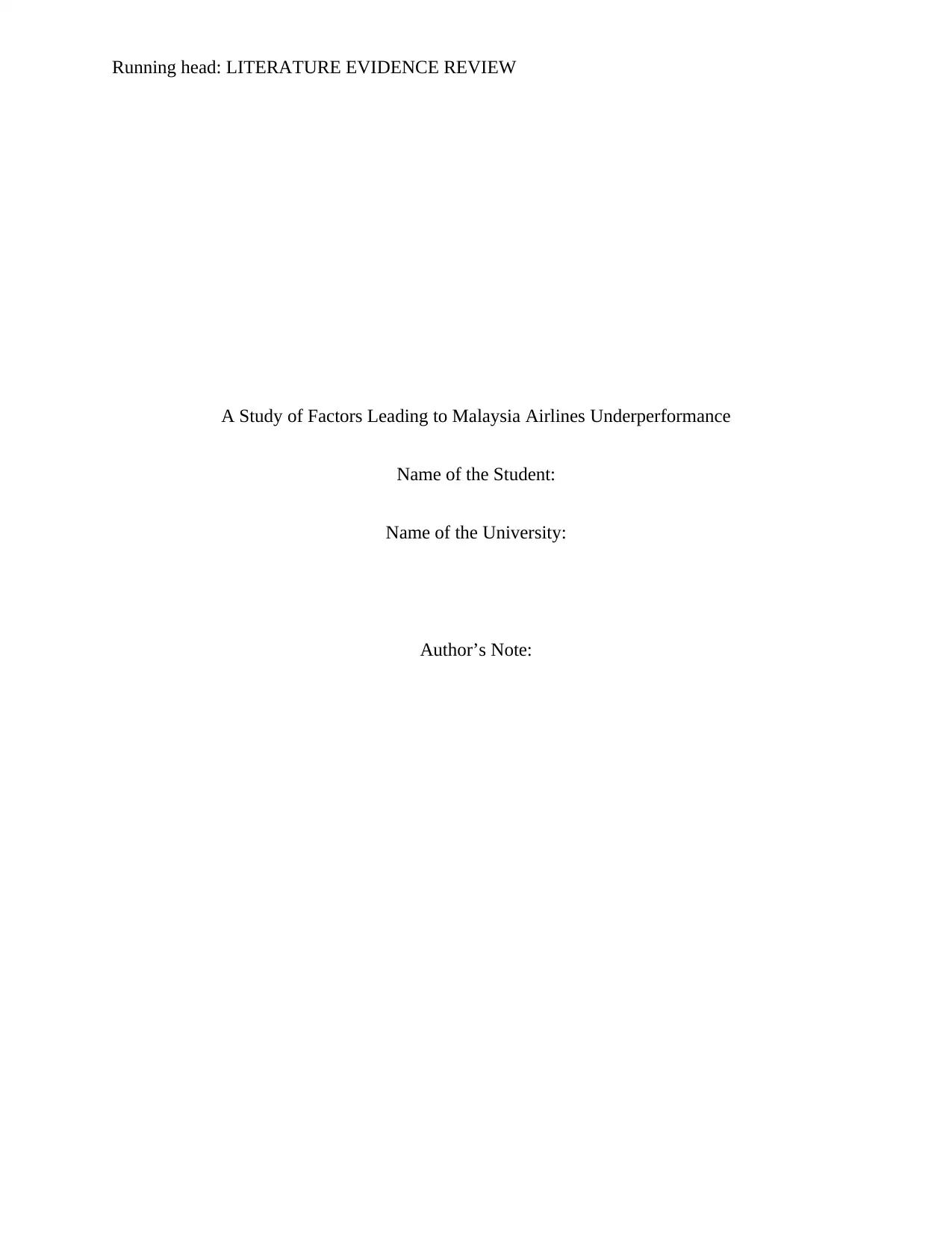
Running head: LITERATURE EVIDENCE REVIEW
A Study of Factors Leading to Malaysia Airlines Underperformance
Name of the Student:
Name of the University:
Author’s Note:
A Study of Factors Leading to Malaysia Airlines Underperformance
Name of the Student:
Name of the University:
Author’s Note:
Secure Best Marks with AI Grader
Need help grading? Try our AI Grader for instant feedback on your assignments.
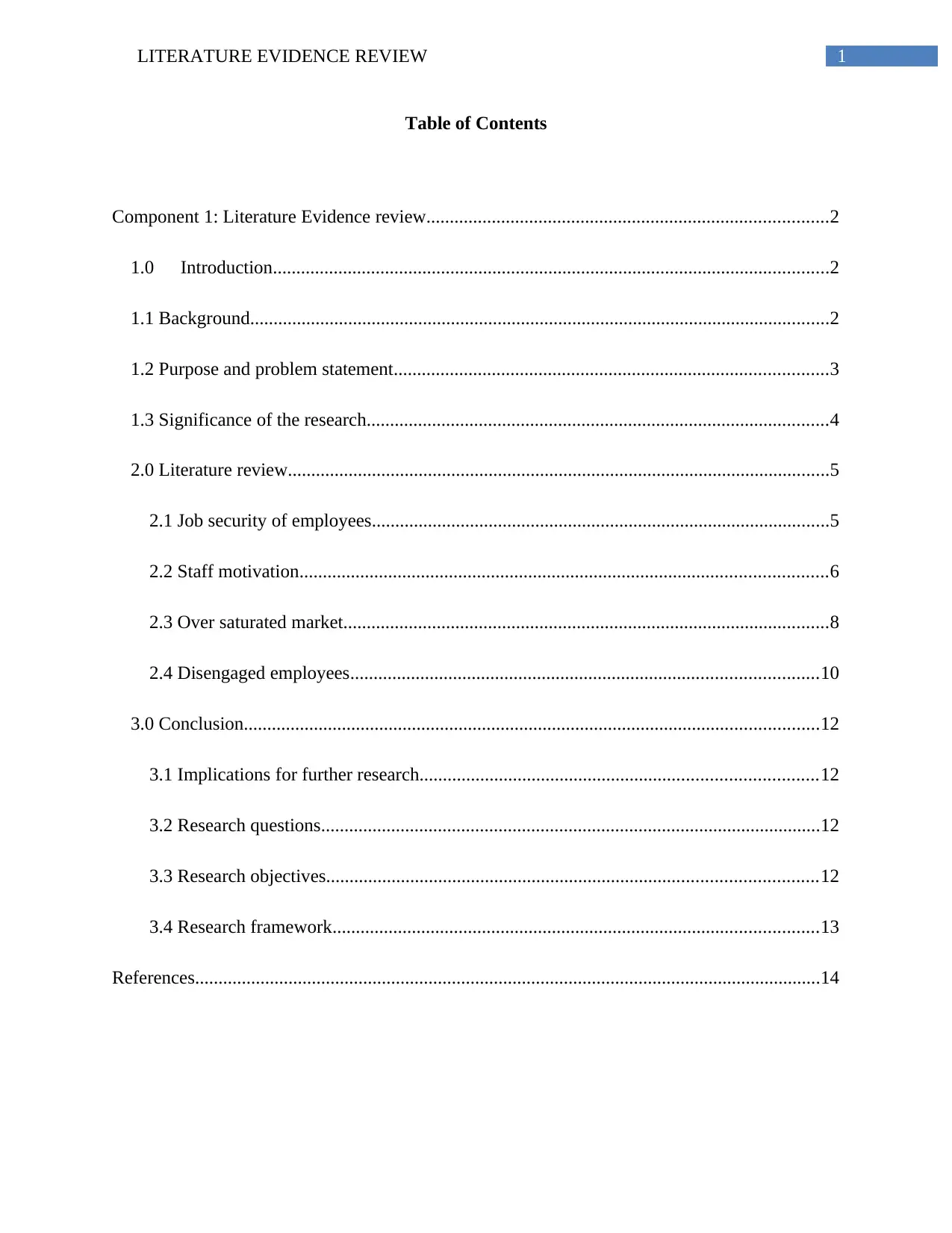
1LITERATURE EVIDENCE REVIEW
Table of Contents
Component 1: Literature Evidence review......................................................................................2
1.0 Introduction.......................................................................................................................2
1.1 Background............................................................................................................................2
1.2 Purpose and problem statement.............................................................................................3
1.3 Significance of the research...................................................................................................4
2.0 Literature review....................................................................................................................5
2.1 Job security of employees..................................................................................................5
2.2 Staff motivation.................................................................................................................6
2.3 Over saturated market........................................................................................................8
2.4 Disengaged employees....................................................................................................10
3.0 Conclusion...........................................................................................................................12
3.1 Implications for further research.....................................................................................12
3.2 Research questions...........................................................................................................12
3.3 Research objectives.........................................................................................................12
3.4 Research framework........................................................................................................13
References......................................................................................................................................14
Table of Contents
Component 1: Literature Evidence review......................................................................................2
1.0 Introduction.......................................................................................................................2
1.1 Background............................................................................................................................2
1.2 Purpose and problem statement.............................................................................................3
1.3 Significance of the research...................................................................................................4
2.0 Literature review....................................................................................................................5
2.1 Job security of employees..................................................................................................5
2.2 Staff motivation.................................................................................................................6
2.3 Over saturated market........................................................................................................8
2.4 Disengaged employees....................................................................................................10
3.0 Conclusion...........................................................................................................................12
3.1 Implications for further research.....................................................................................12
3.2 Research questions...........................................................................................................12
3.3 Research objectives.........................................................................................................12
3.4 Research framework........................................................................................................13
References......................................................................................................................................14
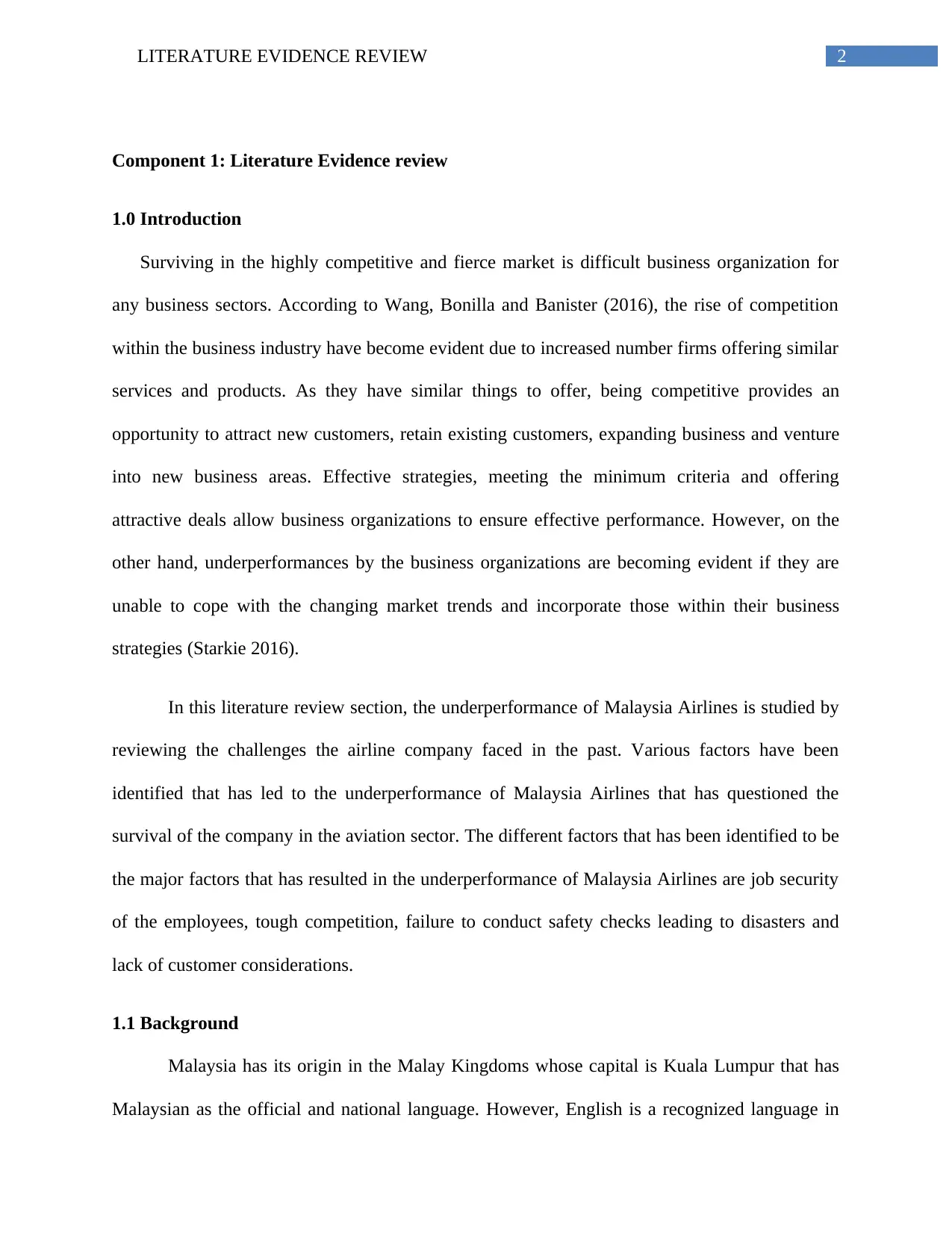
2LITERATURE EVIDENCE REVIEW
Component 1: Literature Evidence review
1.0 Introduction
Surviving in the highly competitive and fierce market is difficult business organization for
any business sectors. According to Wang, Bonilla and Banister (2016), the rise of competition
within the business industry have become evident due to increased number firms offering similar
services and products. As they have similar things to offer, being competitive provides an
opportunity to attract new customers, retain existing customers, expanding business and venture
into new business areas. Effective strategies, meeting the minimum criteria and offering
attractive deals allow business organizations to ensure effective performance. However, on the
other hand, underperformances by the business organizations are becoming evident if they are
unable to cope with the changing market trends and incorporate those within their business
strategies (Starkie 2016).
In this literature review section, the underperformance of Malaysia Airlines is studied by
reviewing the challenges the airline company faced in the past. Various factors have been
identified that has led to the underperformance of Malaysia Airlines that has questioned the
survival of the company in the aviation sector. The different factors that has been identified to be
the major factors that has resulted in the underperformance of Malaysia Airlines are job security
of the employees, tough competition, failure to conduct safety checks leading to disasters and
lack of customer considerations.
1.1 Background
Malaysia has its origin in the Malay Kingdoms whose capital is Kuala Lumpur that has
Malaysian as the official and national language. However, English is a recognized language in
Component 1: Literature Evidence review
1.0 Introduction
Surviving in the highly competitive and fierce market is difficult business organization for
any business sectors. According to Wang, Bonilla and Banister (2016), the rise of competition
within the business industry have become evident due to increased number firms offering similar
services and products. As they have similar things to offer, being competitive provides an
opportunity to attract new customers, retain existing customers, expanding business and venture
into new business areas. Effective strategies, meeting the minimum criteria and offering
attractive deals allow business organizations to ensure effective performance. However, on the
other hand, underperformances by the business organizations are becoming evident if they are
unable to cope with the changing market trends and incorporate those within their business
strategies (Starkie 2016).
In this literature review section, the underperformance of Malaysia Airlines is studied by
reviewing the challenges the airline company faced in the past. Various factors have been
identified that has led to the underperformance of Malaysia Airlines that has questioned the
survival of the company in the aviation sector. The different factors that has been identified to be
the major factors that has resulted in the underperformance of Malaysia Airlines are job security
of the employees, tough competition, failure to conduct safety checks leading to disasters and
lack of customer considerations.
1.1 Background
Malaysia has its origin in the Malay Kingdoms whose capital is Kuala Lumpur that has
Malaysian as the official and national language. However, English is a recognized language in
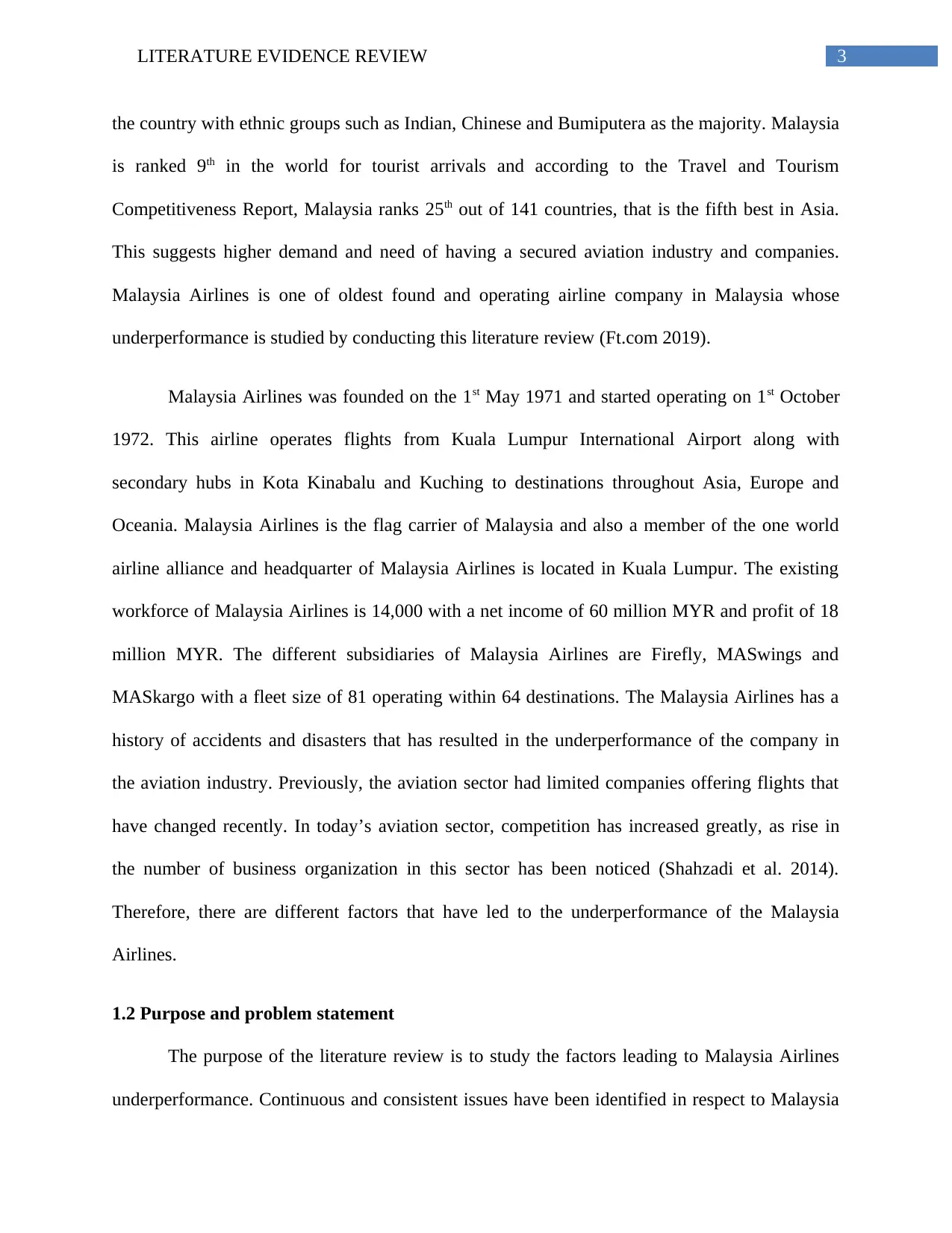
3LITERATURE EVIDENCE REVIEW
the country with ethnic groups such as Indian, Chinese and Bumiputera as the majority. Malaysia
is ranked 9th in the world for tourist arrivals and according to the Travel and Tourism
Competitiveness Report, Malaysia ranks 25th out of 141 countries, that is the fifth best in Asia.
This suggests higher demand and need of having a secured aviation industry and companies.
Malaysia Airlines is one of oldest found and operating airline company in Malaysia whose
underperformance is studied by conducting this literature review (Ft.com 2019).
Malaysia Airlines was founded on the 1st May 1971 and started operating on 1st October
1972. This airline operates flights from Kuala Lumpur International Airport along with
secondary hubs in Kota Kinabalu and Kuching to destinations throughout Asia, Europe and
Oceania. Malaysia Airlines is the flag carrier of Malaysia and also a member of the one world
airline alliance and headquarter of Malaysia Airlines is located in Kuala Lumpur. The existing
workforce of Malaysia Airlines is 14,000 with a net income of 60 million MYR and profit of 18
million MYR. The different subsidiaries of Malaysia Airlines are Firefly, MASwings and
MASkargo with a fleet size of 81 operating within 64 destinations. The Malaysia Airlines has a
history of accidents and disasters that has resulted in the underperformance of the company in
the aviation industry. Previously, the aviation sector had limited companies offering flights that
have changed recently. In today’s aviation sector, competition has increased greatly, as rise in
the number of business organization in this sector has been noticed (Shahzadi et al. 2014).
Therefore, there are different factors that have led to the underperformance of the Malaysia
Airlines.
1.2 Purpose and problem statement
The purpose of the literature review is to study the factors leading to Malaysia Airlines
underperformance. Continuous and consistent issues have been identified in respect to Malaysia
the country with ethnic groups such as Indian, Chinese and Bumiputera as the majority. Malaysia
is ranked 9th in the world for tourist arrivals and according to the Travel and Tourism
Competitiveness Report, Malaysia ranks 25th out of 141 countries, that is the fifth best in Asia.
This suggests higher demand and need of having a secured aviation industry and companies.
Malaysia Airlines is one of oldest found and operating airline company in Malaysia whose
underperformance is studied by conducting this literature review (Ft.com 2019).
Malaysia Airlines was founded on the 1st May 1971 and started operating on 1st October
1972. This airline operates flights from Kuala Lumpur International Airport along with
secondary hubs in Kota Kinabalu and Kuching to destinations throughout Asia, Europe and
Oceania. Malaysia Airlines is the flag carrier of Malaysia and also a member of the one world
airline alliance and headquarter of Malaysia Airlines is located in Kuala Lumpur. The existing
workforce of Malaysia Airlines is 14,000 with a net income of 60 million MYR and profit of 18
million MYR. The different subsidiaries of Malaysia Airlines are Firefly, MASwings and
MASkargo with a fleet size of 81 operating within 64 destinations. The Malaysia Airlines has a
history of accidents and disasters that has resulted in the underperformance of the company in
the aviation industry. Previously, the aviation sector had limited companies offering flights that
have changed recently. In today’s aviation sector, competition has increased greatly, as rise in
the number of business organization in this sector has been noticed (Shahzadi et al. 2014).
Therefore, there are different factors that have led to the underperformance of the Malaysia
Airlines.
1.2 Purpose and problem statement
The purpose of the literature review is to study the factors leading to Malaysia Airlines
underperformance. Continuous and consistent issues have been identified in respect to Malaysia
Secure Best Marks with AI Grader
Need help grading? Try our AI Grader for instant feedback on your assignments.
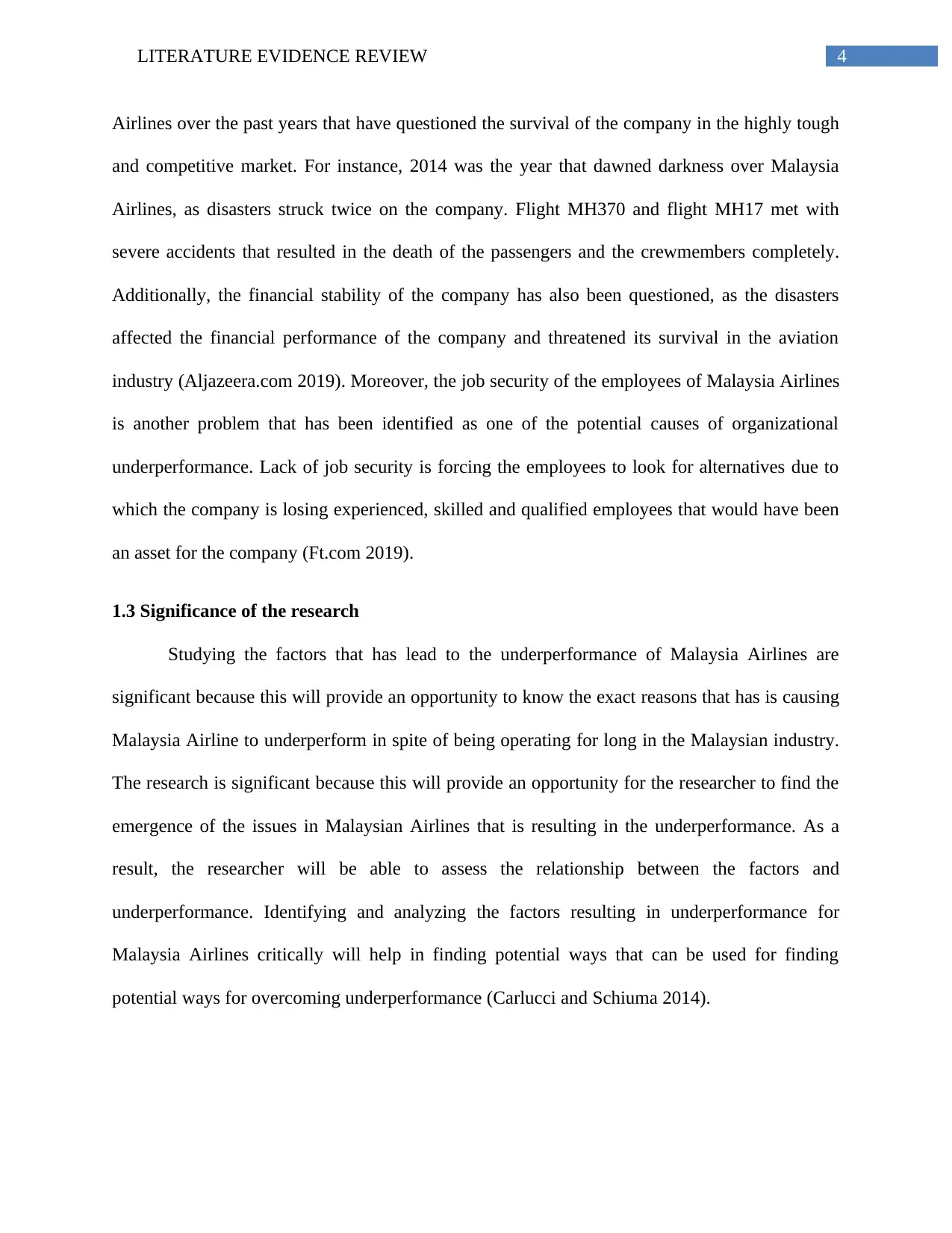
4LITERATURE EVIDENCE REVIEW
Airlines over the past years that have questioned the survival of the company in the highly tough
and competitive market. For instance, 2014 was the year that dawned darkness over Malaysia
Airlines, as disasters struck twice on the company. Flight MH370 and flight MH17 met with
severe accidents that resulted in the death of the passengers and the crewmembers completely.
Additionally, the financial stability of the company has also been questioned, as the disasters
affected the financial performance of the company and threatened its survival in the aviation
industry (Aljazeera.com 2019). Moreover, the job security of the employees of Malaysia Airlines
is another problem that has been identified as one of the potential causes of organizational
underperformance. Lack of job security is forcing the employees to look for alternatives due to
which the company is losing experienced, skilled and qualified employees that would have been
an asset for the company (Ft.com 2019).
1.3 Significance of the research
Studying the factors that has lead to the underperformance of Malaysia Airlines are
significant because this will provide an opportunity to know the exact reasons that has is causing
Malaysia Airline to underperform in spite of being operating for long in the Malaysian industry.
The research is significant because this will provide an opportunity for the researcher to find the
emergence of the issues in Malaysian Airlines that is resulting in the underperformance. As a
result, the researcher will be able to assess the relationship between the factors and
underperformance. Identifying and analyzing the factors resulting in underperformance for
Malaysia Airlines critically will help in finding potential ways that can be used for finding
potential ways for overcoming underperformance (Carlucci and Schiuma 2014).
Airlines over the past years that have questioned the survival of the company in the highly tough
and competitive market. For instance, 2014 was the year that dawned darkness over Malaysia
Airlines, as disasters struck twice on the company. Flight MH370 and flight MH17 met with
severe accidents that resulted in the death of the passengers and the crewmembers completely.
Additionally, the financial stability of the company has also been questioned, as the disasters
affected the financial performance of the company and threatened its survival in the aviation
industry (Aljazeera.com 2019). Moreover, the job security of the employees of Malaysia Airlines
is another problem that has been identified as one of the potential causes of organizational
underperformance. Lack of job security is forcing the employees to look for alternatives due to
which the company is losing experienced, skilled and qualified employees that would have been
an asset for the company (Ft.com 2019).
1.3 Significance of the research
Studying the factors that has lead to the underperformance of Malaysia Airlines are
significant because this will provide an opportunity to know the exact reasons that has is causing
Malaysia Airline to underperform in spite of being operating for long in the Malaysian industry.
The research is significant because this will provide an opportunity for the researcher to find the
emergence of the issues in Malaysian Airlines that is resulting in the underperformance. As a
result, the researcher will be able to assess the relationship between the factors and
underperformance. Identifying and analyzing the factors resulting in underperformance for
Malaysia Airlines critically will help in finding potential ways that can be used for finding
potential ways for overcoming underperformance (Carlucci and Schiuma 2014).
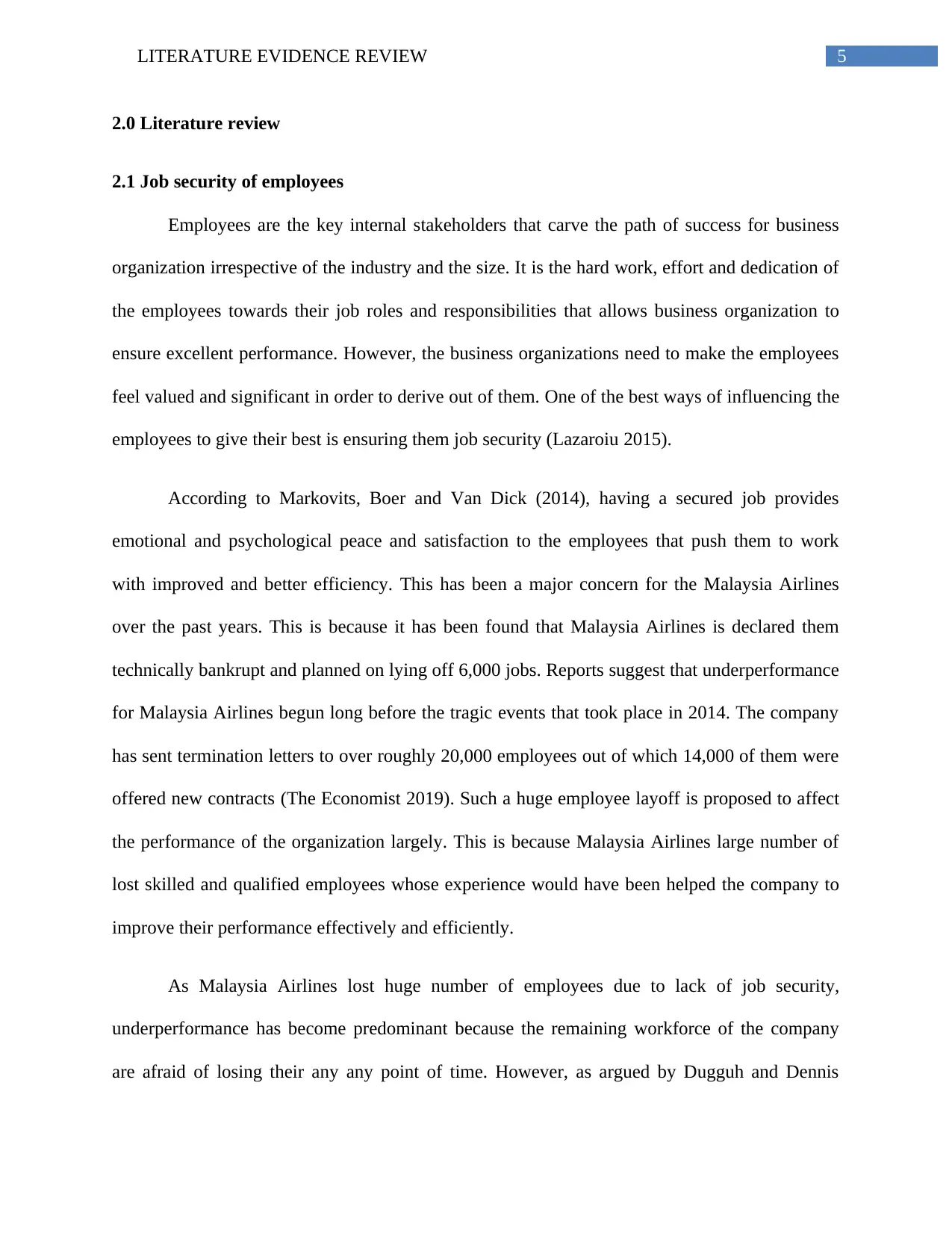
5LITERATURE EVIDENCE REVIEW
2.0 Literature review
2.1 Job security of employees
Employees are the key internal stakeholders that carve the path of success for business
organization irrespective of the industry and the size. It is the hard work, effort and dedication of
the employees towards their job roles and responsibilities that allows business organization to
ensure excellent performance. However, the business organizations need to make the employees
feel valued and significant in order to derive out of them. One of the best ways of influencing the
employees to give their best is ensuring them job security (Lazaroiu 2015).
According to Markovits, Boer and Van Dick (2014), having a secured job provides
emotional and psychological peace and satisfaction to the employees that push them to work
with improved and better efficiency. This has been a major concern for the Malaysia Airlines
over the past years. This is because it has been found that Malaysia Airlines is declared them
technically bankrupt and planned on lying off 6,000 jobs. Reports suggest that underperformance
for Malaysia Airlines begun long before the tragic events that took place in 2014. The company
has sent termination letters to over roughly 20,000 employees out of which 14,000 of them were
offered new contracts (The Economist 2019). Such a huge employee layoff is proposed to affect
the performance of the organization largely. This is because Malaysia Airlines large number of
lost skilled and qualified employees whose experience would have been helped the company to
improve their performance effectively and efficiently.
As Malaysia Airlines lost huge number of employees due to lack of job security,
underperformance has become predominant because the remaining workforce of the company
are afraid of losing their any any point of time. However, as argued by Dugguh and Dennis
2.0 Literature review
2.1 Job security of employees
Employees are the key internal stakeholders that carve the path of success for business
organization irrespective of the industry and the size. It is the hard work, effort and dedication of
the employees towards their job roles and responsibilities that allows business organization to
ensure excellent performance. However, the business organizations need to make the employees
feel valued and significant in order to derive out of them. One of the best ways of influencing the
employees to give their best is ensuring them job security (Lazaroiu 2015).
According to Markovits, Boer and Van Dick (2014), having a secured job provides
emotional and psychological peace and satisfaction to the employees that push them to work
with improved and better efficiency. This has been a major concern for the Malaysia Airlines
over the past years. This is because it has been found that Malaysia Airlines is declared them
technically bankrupt and planned on lying off 6,000 jobs. Reports suggest that underperformance
for Malaysia Airlines begun long before the tragic events that took place in 2014. The company
has sent termination letters to over roughly 20,000 employees out of which 14,000 of them were
offered new contracts (The Economist 2019). Such a huge employee layoff is proposed to affect
the performance of the organization largely. This is because Malaysia Airlines large number of
lost skilled and qualified employees whose experience would have been helped the company to
improve their performance effectively and efficiently.
As Malaysia Airlines lost huge number of employees due to lack of job security,
underperformance has become predominant because the remaining workforce of the company
are afraid of losing their any any point of time. However, as argued by Dugguh and Dennis
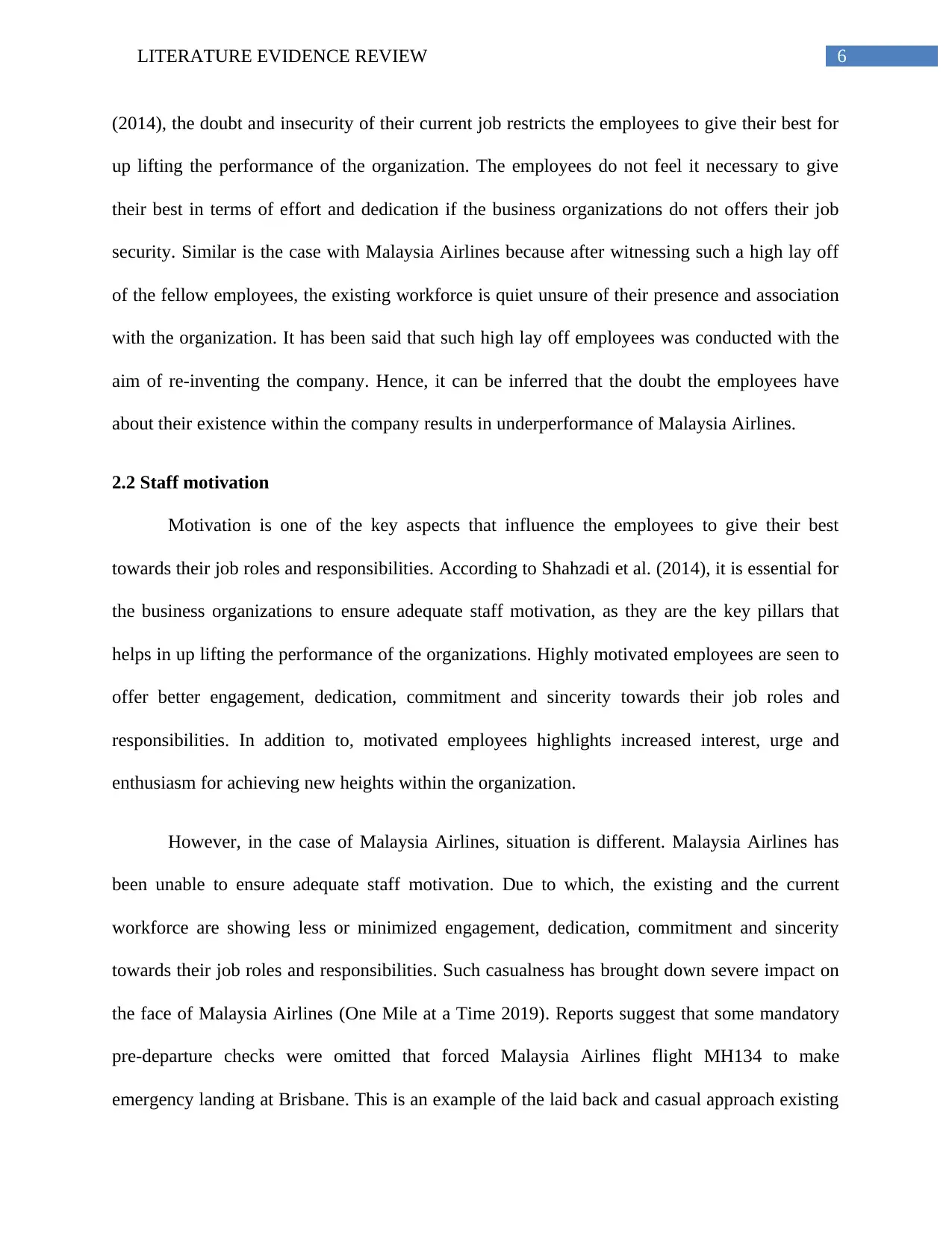
6LITERATURE EVIDENCE REVIEW
(2014), the doubt and insecurity of their current job restricts the employees to give their best for
up lifting the performance of the organization. The employees do not feel it necessary to give
their best in terms of effort and dedication if the business organizations do not offers their job
security. Similar is the case with Malaysia Airlines because after witnessing such a high lay off
of the fellow employees, the existing workforce is quiet unsure of their presence and association
with the organization. It has been said that such high lay off employees was conducted with the
aim of re-inventing the company. Hence, it can be inferred that the doubt the employees have
about their existence within the company results in underperformance of Malaysia Airlines.
2.2 Staff motivation
Motivation is one of the key aspects that influence the employees to give their best
towards their job roles and responsibilities. According to Shahzadi et al. (2014), it is essential for
the business organizations to ensure adequate staff motivation, as they are the key pillars that
helps in up lifting the performance of the organizations. Highly motivated employees are seen to
offer better engagement, dedication, commitment and sincerity towards their job roles and
responsibilities. In addition to, motivated employees highlights increased interest, urge and
enthusiasm for achieving new heights within the organization.
However, in the case of Malaysia Airlines, situation is different. Malaysia Airlines has
been unable to ensure adequate staff motivation. Due to which, the existing and the current
workforce are showing less or minimized engagement, dedication, commitment and sincerity
towards their job roles and responsibilities. Such casualness has brought down severe impact on
the face of Malaysia Airlines (One Mile at a Time 2019). Reports suggest that some mandatory
pre-departure checks were omitted that forced Malaysia Airlines flight MH134 to make
emergency landing at Brisbane. This is an example of the laid back and casual approach existing
(2014), the doubt and insecurity of their current job restricts the employees to give their best for
up lifting the performance of the organization. The employees do not feel it necessary to give
their best in terms of effort and dedication if the business organizations do not offers their job
security. Similar is the case with Malaysia Airlines because after witnessing such a high lay off
of the fellow employees, the existing workforce is quiet unsure of their presence and association
with the organization. It has been said that such high lay off employees was conducted with the
aim of re-inventing the company. Hence, it can be inferred that the doubt the employees have
about their existence within the company results in underperformance of Malaysia Airlines.
2.2 Staff motivation
Motivation is one of the key aspects that influence the employees to give their best
towards their job roles and responsibilities. According to Shahzadi et al. (2014), it is essential for
the business organizations to ensure adequate staff motivation, as they are the key pillars that
helps in up lifting the performance of the organizations. Highly motivated employees are seen to
offer better engagement, dedication, commitment and sincerity towards their job roles and
responsibilities. In addition to, motivated employees highlights increased interest, urge and
enthusiasm for achieving new heights within the organization.
However, in the case of Malaysia Airlines, situation is different. Malaysia Airlines has
been unable to ensure adequate staff motivation. Due to which, the existing and the current
workforce are showing less or minimized engagement, dedication, commitment and sincerity
towards their job roles and responsibilities. Such casualness has brought down severe impact on
the face of Malaysia Airlines (One Mile at a Time 2019). Reports suggest that some mandatory
pre-departure checks were omitted that forced Malaysia Airlines flight MH134 to make
emergency landing at Brisbane. This is an example of the laid back and casual approach existing
Paraphrase This Document
Need a fresh take? Get an instant paraphrase of this document with our AI Paraphraser
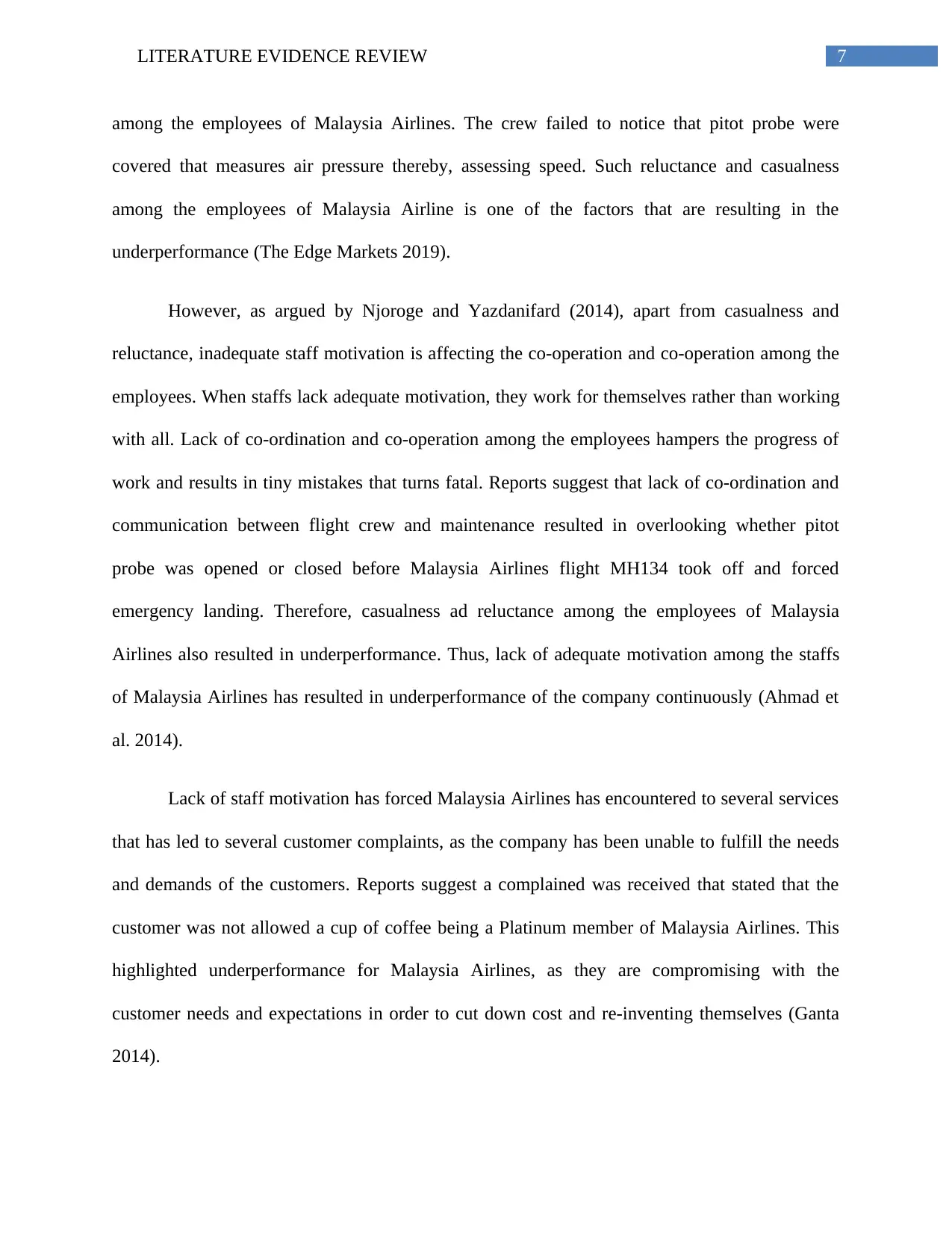
7LITERATURE EVIDENCE REVIEW
among the employees of Malaysia Airlines. The crew failed to notice that pitot probe were
covered that measures air pressure thereby, assessing speed. Such reluctance and casualness
among the employees of Malaysia Airline is one of the factors that are resulting in the
underperformance (The Edge Markets 2019).
However, as argued by Njoroge and Yazdanifard (2014), apart from casualness and
reluctance, inadequate staff motivation is affecting the co-operation and co-operation among the
employees. When staffs lack adequate motivation, they work for themselves rather than working
with all. Lack of co-ordination and co-operation among the employees hampers the progress of
work and results in tiny mistakes that turns fatal. Reports suggest that lack of co-ordination and
communication between flight crew and maintenance resulted in overlooking whether pitot
probe was opened or closed before Malaysia Airlines flight MH134 took off and forced
emergency landing. Therefore, casualness ad reluctance among the employees of Malaysia
Airlines also resulted in underperformance. Thus, lack of adequate motivation among the staffs
of Malaysia Airlines has resulted in underperformance of the company continuously (Ahmad et
al. 2014).
Lack of staff motivation has forced Malaysia Airlines has encountered to several services
that has led to several customer complaints, as the company has been unable to fulfill the needs
and demands of the customers. Reports suggest a complained was received that stated that the
customer was not allowed a cup of coffee being a Platinum member of Malaysia Airlines. This
highlighted underperformance for Malaysia Airlines, as they are compromising with the
customer needs and expectations in order to cut down cost and re-inventing themselves (Ganta
2014).
among the employees of Malaysia Airlines. The crew failed to notice that pitot probe were
covered that measures air pressure thereby, assessing speed. Such reluctance and casualness
among the employees of Malaysia Airline is one of the factors that are resulting in the
underperformance (The Edge Markets 2019).
However, as argued by Njoroge and Yazdanifard (2014), apart from casualness and
reluctance, inadequate staff motivation is affecting the co-operation and co-operation among the
employees. When staffs lack adequate motivation, they work for themselves rather than working
with all. Lack of co-ordination and co-operation among the employees hampers the progress of
work and results in tiny mistakes that turns fatal. Reports suggest that lack of co-ordination and
communication between flight crew and maintenance resulted in overlooking whether pitot
probe was opened or closed before Malaysia Airlines flight MH134 took off and forced
emergency landing. Therefore, casualness ad reluctance among the employees of Malaysia
Airlines also resulted in underperformance. Thus, lack of adequate motivation among the staffs
of Malaysia Airlines has resulted in underperformance of the company continuously (Ahmad et
al. 2014).
Lack of staff motivation has forced Malaysia Airlines has encountered to several services
that has led to several customer complaints, as the company has been unable to fulfill the needs
and demands of the customers. Reports suggest a complained was received that stated that the
customer was not allowed a cup of coffee being a Platinum member of Malaysia Airlines. This
highlighted underperformance for Malaysia Airlines, as they are compromising with the
customer needs and expectations in order to cut down cost and re-inventing themselves (Ganta
2014).
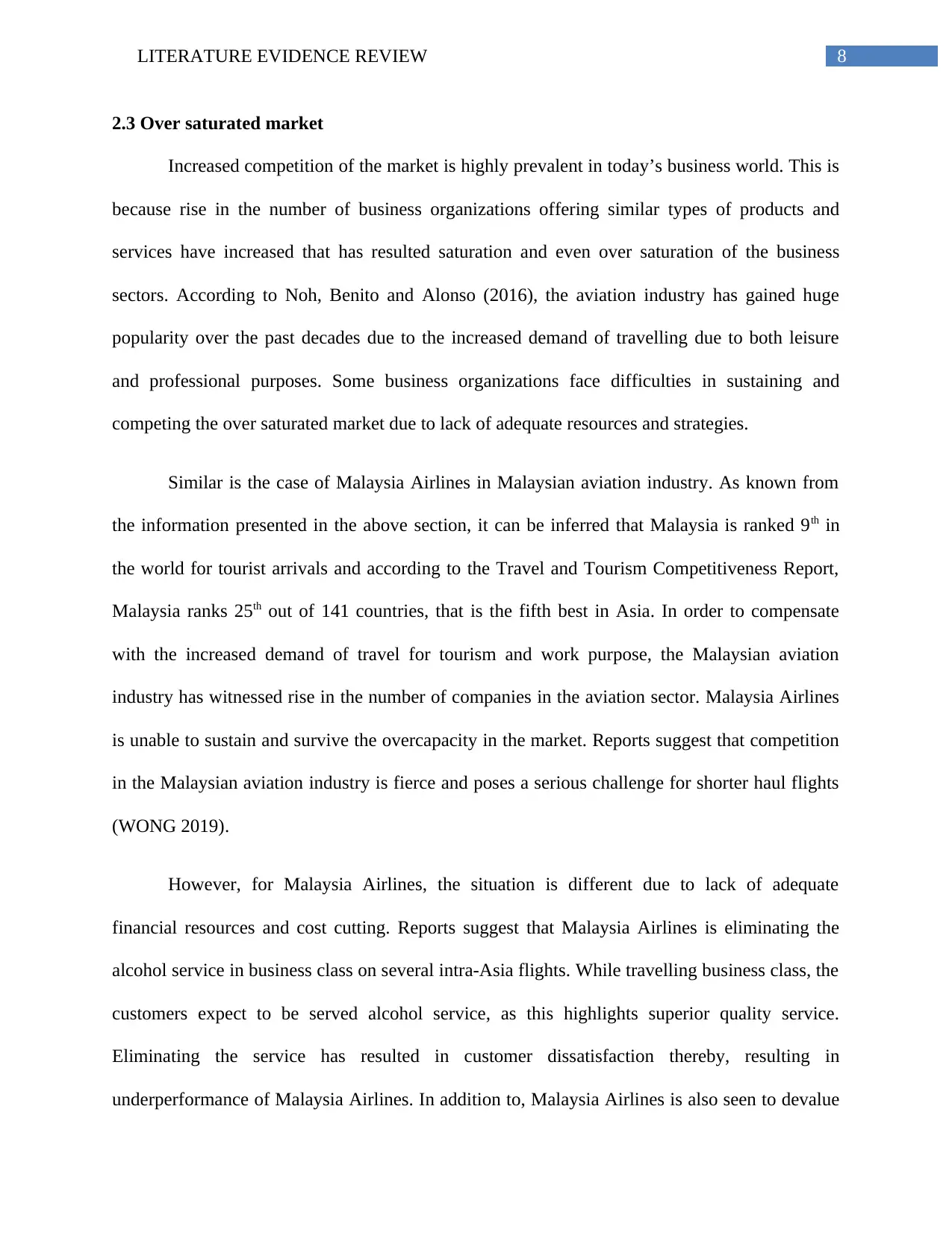
8LITERATURE EVIDENCE REVIEW
2.3 Over saturated market
Increased competition of the market is highly prevalent in today’s business world. This is
because rise in the number of business organizations offering similar types of products and
services have increased that has resulted saturation and even over saturation of the business
sectors. According to Noh, Benito and Alonso (2016), the aviation industry has gained huge
popularity over the past decades due to the increased demand of travelling due to both leisure
and professional purposes. Some business organizations face difficulties in sustaining and
competing the over saturated market due to lack of adequate resources and strategies.
Similar is the case of Malaysia Airlines in Malaysian aviation industry. As known from
the information presented in the above section, it can be inferred that Malaysia is ranked 9th in
the world for tourist arrivals and according to the Travel and Tourism Competitiveness Report,
Malaysia ranks 25th out of 141 countries, that is the fifth best in Asia. In order to compensate
with the increased demand of travel for tourism and work purpose, the Malaysian aviation
industry has witnessed rise in the number of companies in the aviation sector. Malaysia Airlines
is unable to sustain and survive the overcapacity in the market. Reports suggest that competition
in the Malaysian aviation industry is fierce and poses a serious challenge for shorter haul flights
(WONG 2019).
However, for Malaysia Airlines, the situation is different due to lack of adequate
financial resources and cost cutting. Reports suggest that Malaysia Airlines is eliminating the
alcohol service in business class on several intra-Asia flights. While travelling business class, the
customers expect to be served alcohol service, as this highlights superior quality service.
Eliminating the service has resulted in customer dissatisfaction thereby, resulting in
underperformance of Malaysia Airlines. In addition to, Malaysia Airlines is also seen to devalue
2.3 Over saturated market
Increased competition of the market is highly prevalent in today’s business world. This is
because rise in the number of business organizations offering similar types of products and
services have increased that has resulted saturation and even over saturation of the business
sectors. According to Noh, Benito and Alonso (2016), the aviation industry has gained huge
popularity over the past decades due to the increased demand of travelling due to both leisure
and professional purposes. Some business organizations face difficulties in sustaining and
competing the over saturated market due to lack of adequate resources and strategies.
Similar is the case of Malaysia Airlines in Malaysian aviation industry. As known from
the information presented in the above section, it can be inferred that Malaysia is ranked 9th in
the world for tourist arrivals and according to the Travel and Tourism Competitiveness Report,
Malaysia ranks 25th out of 141 countries, that is the fifth best in Asia. In order to compensate
with the increased demand of travel for tourism and work purpose, the Malaysian aviation
industry has witnessed rise in the number of companies in the aviation sector. Malaysia Airlines
is unable to sustain and survive the overcapacity in the market. Reports suggest that competition
in the Malaysian aviation industry is fierce and poses a serious challenge for shorter haul flights
(WONG 2019).
However, for Malaysia Airlines, the situation is different due to lack of adequate
financial resources and cost cutting. Reports suggest that Malaysia Airlines is eliminating the
alcohol service in business class on several intra-Asia flights. While travelling business class, the
customers expect to be served alcohol service, as this highlights superior quality service.
Eliminating the service has resulted in customer dissatisfaction thereby, resulting in
underperformance of Malaysia Airlines. In addition to, Malaysia Airlines is also seen to devalue
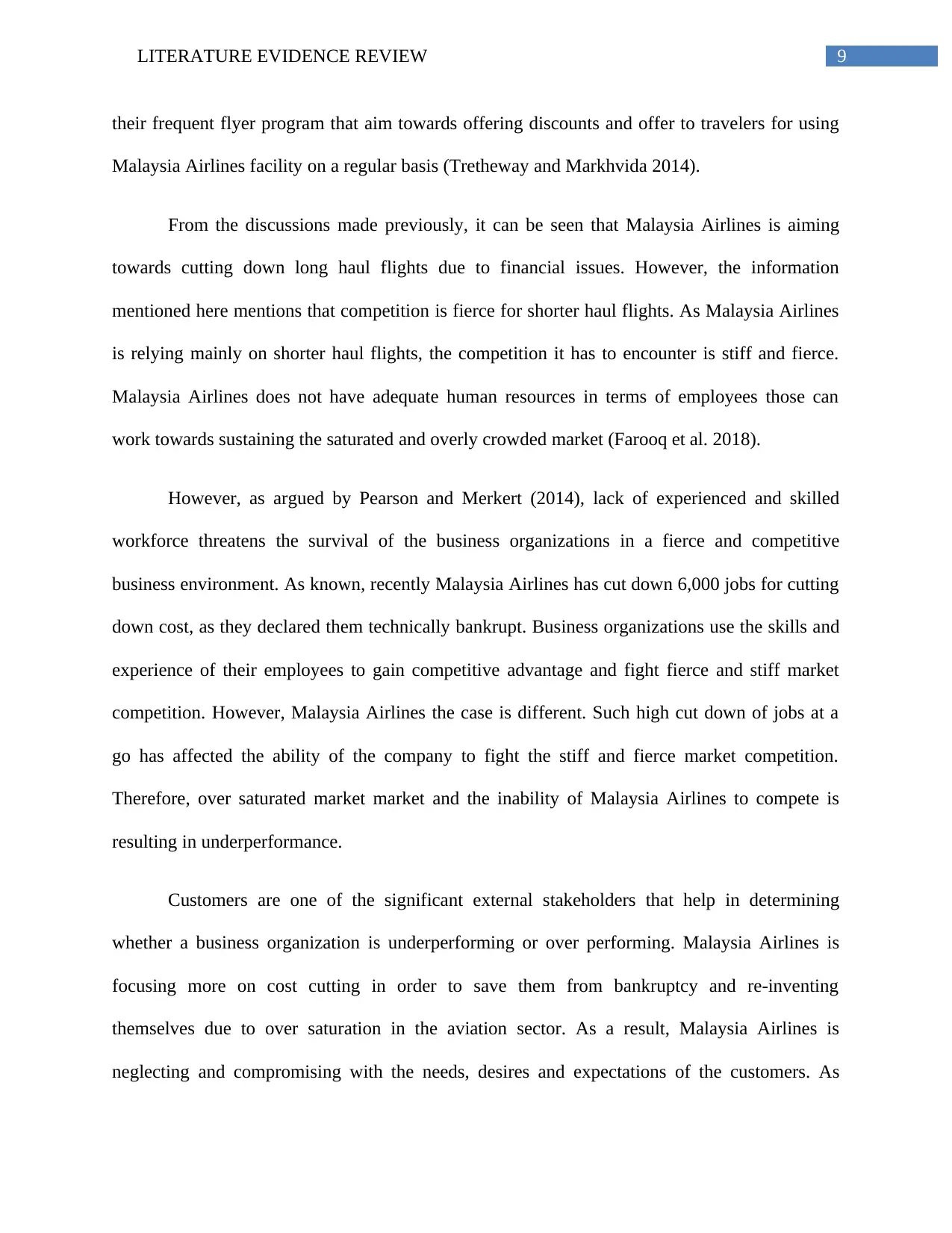
9LITERATURE EVIDENCE REVIEW
their frequent flyer program that aim towards offering discounts and offer to travelers for using
Malaysia Airlines facility on a regular basis (Tretheway and Markhvida 2014).
From the discussions made previously, it can be seen that Malaysia Airlines is aiming
towards cutting down long haul flights due to financial issues. However, the information
mentioned here mentions that competition is fierce for shorter haul flights. As Malaysia Airlines
is relying mainly on shorter haul flights, the competition it has to encounter is stiff and fierce.
Malaysia Airlines does not have adequate human resources in terms of employees those can
work towards sustaining the saturated and overly crowded market (Farooq et al. 2018).
However, as argued by Pearson and Merkert (2014), lack of experienced and skilled
workforce threatens the survival of the business organizations in a fierce and competitive
business environment. As known, recently Malaysia Airlines has cut down 6,000 jobs for cutting
down cost, as they declared them technically bankrupt. Business organizations use the skills and
experience of their employees to gain competitive advantage and fight fierce and stiff market
competition. However, Malaysia Airlines the case is different. Such high cut down of jobs at a
go has affected the ability of the company to fight the stiff and fierce market competition.
Therefore, over saturated market market and the inability of Malaysia Airlines to compete is
resulting in underperformance.
Customers are one of the significant external stakeholders that help in determining
whether a business organization is underperforming or over performing. Malaysia Airlines is
focusing more on cost cutting in order to save them from bankruptcy and re-inventing
themselves due to over saturation in the aviation sector. As a result, Malaysia Airlines is
neglecting and compromising with the needs, desires and expectations of the customers. As
their frequent flyer program that aim towards offering discounts and offer to travelers for using
Malaysia Airlines facility on a regular basis (Tretheway and Markhvida 2014).
From the discussions made previously, it can be seen that Malaysia Airlines is aiming
towards cutting down long haul flights due to financial issues. However, the information
mentioned here mentions that competition is fierce for shorter haul flights. As Malaysia Airlines
is relying mainly on shorter haul flights, the competition it has to encounter is stiff and fierce.
Malaysia Airlines does not have adequate human resources in terms of employees those can
work towards sustaining the saturated and overly crowded market (Farooq et al. 2018).
However, as argued by Pearson and Merkert (2014), lack of experienced and skilled
workforce threatens the survival of the business organizations in a fierce and competitive
business environment. As known, recently Malaysia Airlines has cut down 6,000 jobs for cutting
down cost, as they declared them technically bankrupt. Business organizations use the skills and
experience of their employees to gain competitive advantage and fight fierce and stiff market
competition. However, Malaysia Airlines the case is different. Such high cut down of jobs at a
go has affected the ability of the company to fight the stiff and fierce market competition.
Therefore, over saturated market market and the inability of Malaysia Airlines to compete is
resulting in underperformance.
Customers are one of the significant external stakeholders that help in determining
whether a business organization is underperforming or over performing. Malaysia Airlines is
focusing more on cost cutting in order to save them from bankruptcy and re-inventing
themselves due to over saturation in the aviation sector. As a result, Malaysia Airlines is
neglecting and compromising with the needs, desires and expectations of the customers. As
Secure Best Marks with AI Grader
Need help grading? Try our AI Grader for instant feedback on your assignments.
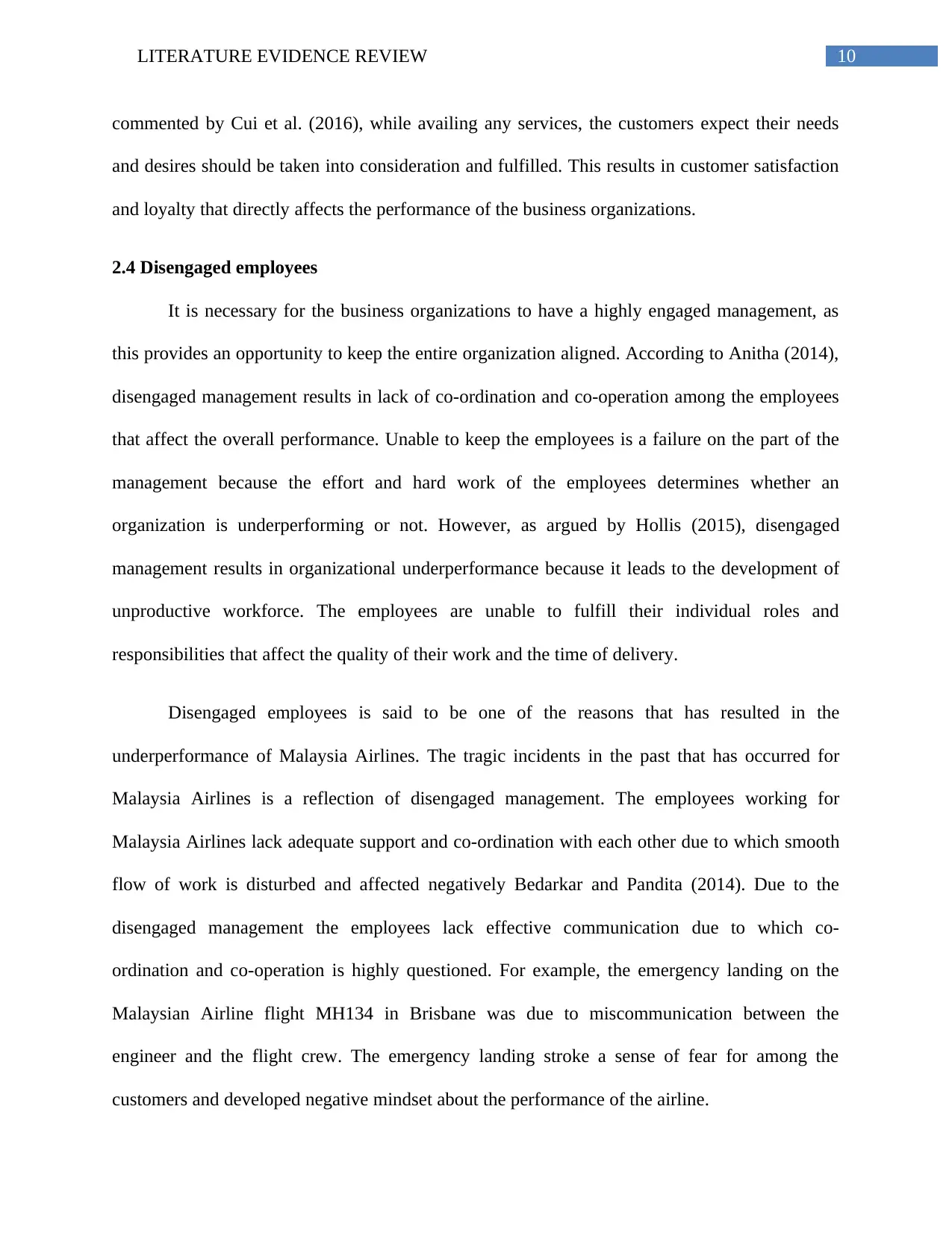
10LITERATURE EVIDENCE REVIEW
commented by Cui et al. (2016), while availing any services, the customers expect their needs
and desires should be taken into consideration and fulfilled. This results in customer satisfaction
and loyalty that directly affects the performance of the business organizations.
2.4 Disengaged employees
It is necessary for the business organizations to have a highly engaged management, as
this provides an opportunity to keep the entire organization aligned. According to Anitha (2014),
disengaged management results in lack of co-ordination and co-operation among the employees
that affect the overall performance. Unable to keep the employees is a failure on the part of the
management because the effort and hard work of the employees determines whether an
organization is underperforming or not. However, as argued by Hollis (2015), disengaged
management results in organizational underperformance because it leads to the development of
unproductive workforce. The employees are unable to fulfill their individual roles and
responsibilities that affect the quality of their work and the time of delivery.
Disengaged employees is said to be one of the reasons that has resulted in the
underperformance of Malaysia Airlines. The tragic incidents in the past that has occurred for
Malaysia Airlines is a reflection of disengaged management. The employees working for
Malaysia Airlines lack adequate support and co-ordination with each other due to which smooth
flow of work is disturbed and affected negatively Bedarkar and Pandita (2014). Due to the
disengaged management the employees lack effective communication due to which co-
ordination and co-operation is highly questioned. For example, the emergency landing on the
Malaysian Airline flight MH134 in Brisbane was due to miscommunication between the
engineer and the flight crew. The emergency landing stroke a sense of fear for among the
customers and developed negative mindset about the performance of the airline.
commented by Cui et al. (2016), while availing any services, the customers expect their needs
and desires should be taken into consideration and fulfilled. This results in customer satisfaction
and loyalty that directly affects the performance of the business organizations.
2.4 Disengaged employees
It is necessary for the business organizations to have a highly engaged management, as
this provides an opportunity to keep the entire organization aligned. According to Anitha (2014),
disengaged management results in lack of co-ordination and co-operation among the employees
that affect the overall performance. Unable to keep the employees is a failure on the part of the
management because the effort and hard work of the employees determines whether an
organization is underperforming or not. However, as argued by Hollis (2015), disengaged
management results in organizational underperformance because it leads to the development of
unproductive workforce. The employees are unable to fulfill their individual roles and
responsibilities that affect the quality of their work and the time of delivery.
Disengaged employees is said to be one of the reasons that has resulted in the
underperformance of Malaysia Airlines. The tragic incidents in the past that has occurred for
Malaysia Airlines is a reflection of disengaged management. The employees working for
Malaysia Airlines lack adequate support and co-ordination with each other due to which smooth
flow of work is disturbed and affected negatively Bedarkar and Pandita (2014). Due to the
disengaged management the employees lack effective communication due to which co-
ordination and co-operation is highly questioned. For example, the emergency landing on the
Malaysian Airline flight MH134 in Brisbane was due to miscommunication between the
engineer and the flight crew. The emergency landing stroke a sense of fear for among the
customers and developed negative mindset about the performance of the airline.
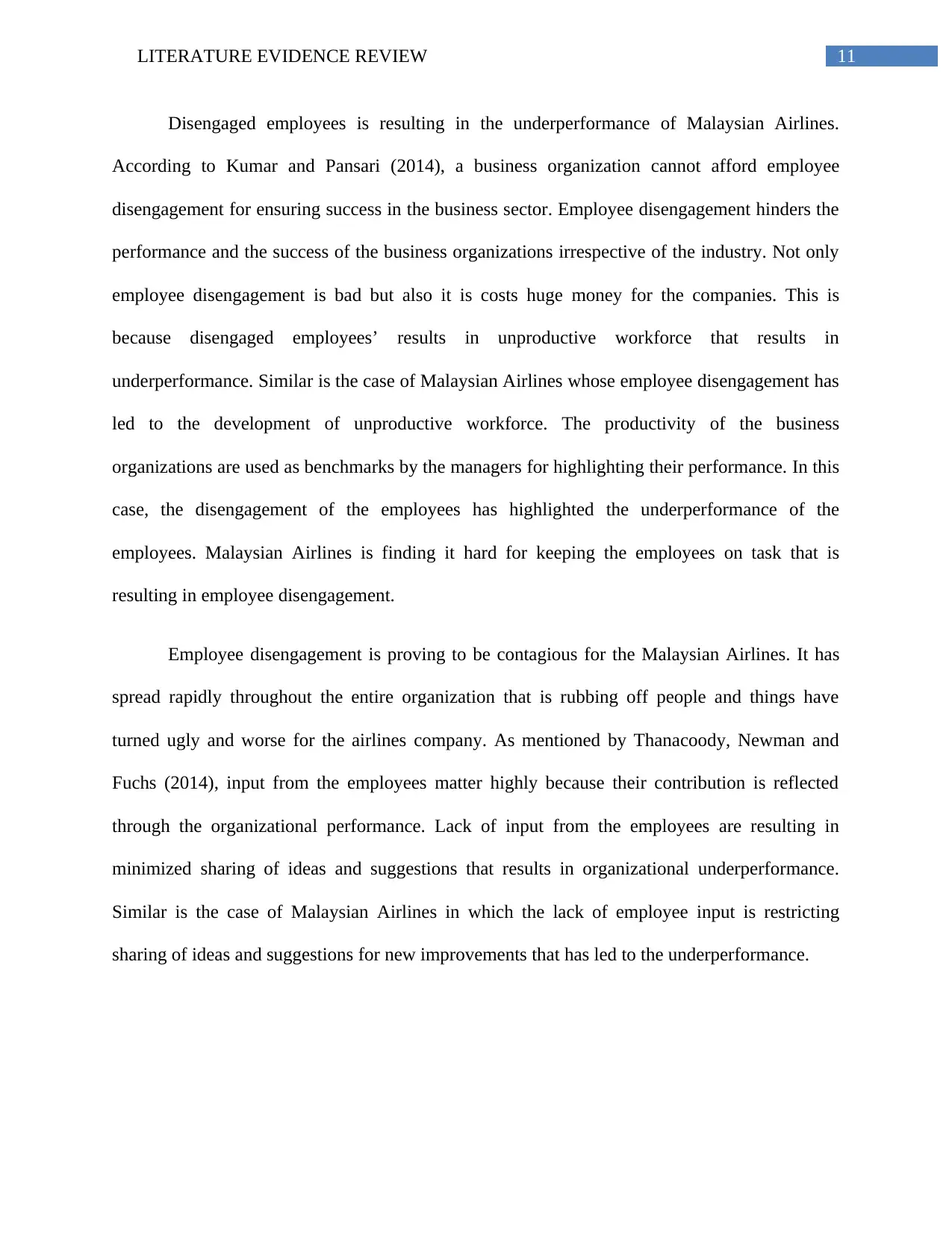
11LITERATURE EVIDENCE REVIEW
Disengaged employees is resulting in the underperformance of Malaysian Airlines.
According to Kumar and Pansari (2014), a business organization cannot afford employee
disengagement for ensuring success in the business sector. Employee disengagement hinders the
performance and the success of the business organizations irrespective of the industry. Not only
employee disengagement is bad but also it is costs huge money for the companies. This is
because disengaged employees’ results in unproductive workforce that results in
underperformance. Similar is the case of Malaysian Airlines whose employee disengagement has
led to the development of unproductive workforce. The productivity of the business
organizations are used as benchmarks by the managers for highlighting their performance. In this
case, the disengagement of the employees has highlighted the underperformance of the
employees. Malaysian Airlines is finding it hard for keeping the employees on task that is
resulting in employee disengagement.
Employee disengagement is proving to be contagious for the Malaysian Airlines. It has
spread rapidly throughout the entire organization that is rubbing off people and things have
turned ugly and worse for the airlines company. As mentioned by Thanacoody, Newman and
Fuchs (2014), input from the employees matter highly because their contribution is reflected
through the organizational performance. Lack of input from the employees are resulting in
minimized sharing of ideas and suggestions that results in organizational underperformance.
Similar is the case of Malaysian Airlines in which the lack of employee input is restricting
sharing of ideas and suggestions for new improvements that has led to the underperformance.
Disengaged employees is resulting in the underperformance of Malaysian Airlines.
According to Kumar and Pansari (2014), a business organization cannot afford employee
disengagement for ensuring success in the business sector. Employee disengagement hinders the
performance and the success of the business organizations irrespective of the industry. Not only
employee disengagement is bad but also it is costs huge money for the companies. This is
because disengaged employees’ results in unproductive workforce that results in
underperformance. Similar is the case of Malaysian Airlines whose employee disengagement has
led to the development of unproductive workforce. The productivity of the business
organizations are used as benchmarks by the managers for highlighting their performance. In this
case, the disengagement of the employees has highlighted the underperformance of the
employees. Malaysian Airlines is finding it hard for keeping the employees on task that is
resulting in employee disengagement.
Employee disengagement is proving to be contagious for the Malaysian Airlines. It has
spread rapidly throughout the entire organization that is rubbing off people and things have
turned ugly and worse for the airlines company. As mentioned by Thanacoody, Newman and
Fuchs (2014), input from the employees matter highly because their contribution is reflected
through the organizational performance. Lack of input from the employees are resulting in
minimized sharing of ideas and suggestions that results in organizational underperformance.
Similar is the case of Malaysian Airlines in which the lack of employee input is restricting
sharing of ideas and suggestions for new improvements that has led to the underperformance.
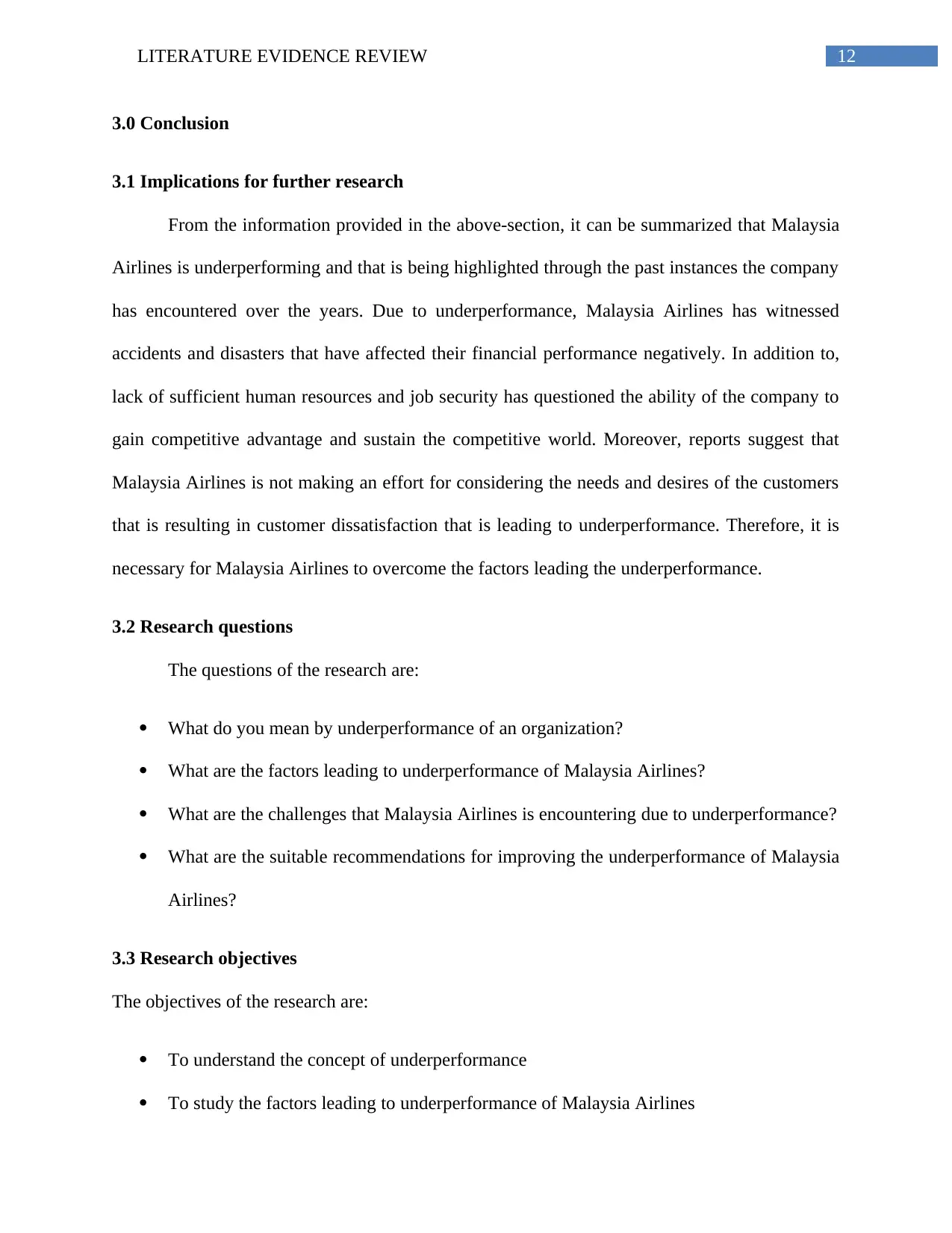
12LITERATURE EVIDENCE REVIEW
3.0 Conclusion
3.1 Implications for further research
From the information provided in the above-section, it can be summarized that Malaysia
Airlines is underperforming and that is being highlighted through the past instances the company
has encountered over the years. Due to underperformance, Malaysia Airlines has witnessed
accidents and disasters that have affected their financial performance negatively. In addition to,
lack of sufficient human resources and job security has questioned the ability of the company to
gain competitive advantage and sustain the competitive world. Moreover, reports suggest that
Malaysia Airlines is not making an effort for considering the needs and desires of the customers
that is resulting in customer dissatisfaction that is leading to underperformance. Therefore, it is
necessary for Malaysia Airlines to overcome the factors leading the underperformance.
3.2 Research questions
The questions of the research are:
What do you mean by underperformance of an organization?
What are the factors leading to underperformance of Malaysia Airlines?
What are the challenges that Malaysia Airlines is encountering due to underperformance?
What are the suitable recommendations for improving the underperformance of Malaysia
Airlines?
3.3 Research objectives
The objectives of the research are:
To understand the concept of underperformance
To study the factors leading to underperformance of Malaysia Airlines
3.0 Conclusion
3.1 Implications for further research
From the information provided in the above-section, it can be summarized that Malaysia
Airlines is underperforming and that is being highlighted through the past instances the company
has encountered over the years. Due to underperformance, Malaysia Airlines has witnessed
accidents and disasters that have affected their financial performance negatively. In addition to,
lack of sufficient human resources and job security has questioned the ability of the company to
gain competitive advantage and sustain the competitive world. Moreover, reports suggest that
Malaysia Airlines is not making an effort for considering the needs and desires of the customers
that is resulting in customer dissatisfaction that is leading to underperformance. Therefore, it is
necessary for Malaysia Airlines to overcome the factors leading the underperformance.
3.2 Research questions
The questions of the research are:
What do you mean by underperformance of an organization?
What are the factors leading to underperformance of Malaysia Airlines?
What are the challenges that Malaysia Airlines is encountering due to underperformance?
What are the suitable recommendations for improving the underperformance of Malaysia
Airlines?
3.3 Research objectives
The objectives of the research are:
To understand the concept of underperformance
To study the factors leading to underperformance of Malaysia Airlines
Paraphrase This Document
Need a fresh take? Get an instant paraphrase of this document with our AI Paraphraser
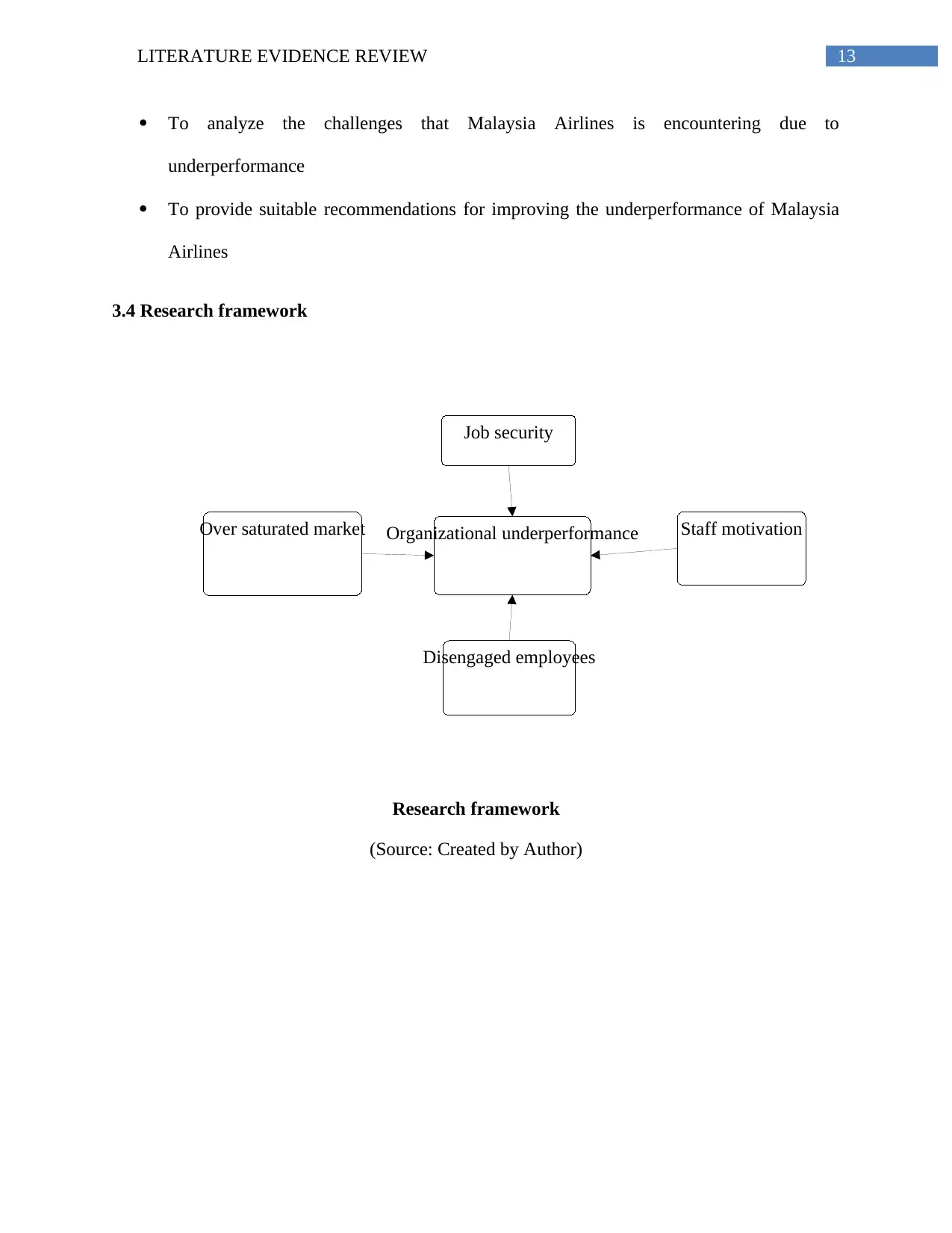
13LITERATURE EVIDENCE REVIEW
Organizational underperformance
Job security
Disengaged employees
Staff motivationOver saturated market
To analyze the challenges that Malaysia Airlines is encountering due to
underperformance
To provide suitable recommendations for improving the underperformance of Malaysia
Airlines
3.4 Research framework
Research framework
(Source: Created by Author)
Organizational underperformance
Job security
Disengaged employees
Staff motivationOver saturated market
To analyze the challenges that Malaysia Airlines is encountering due to
underperformance
To provide suitable recommendations for improving the underperformance of Malaysia
Airlines
3.4 Research framework
Research framework
(Source: Created by Author)
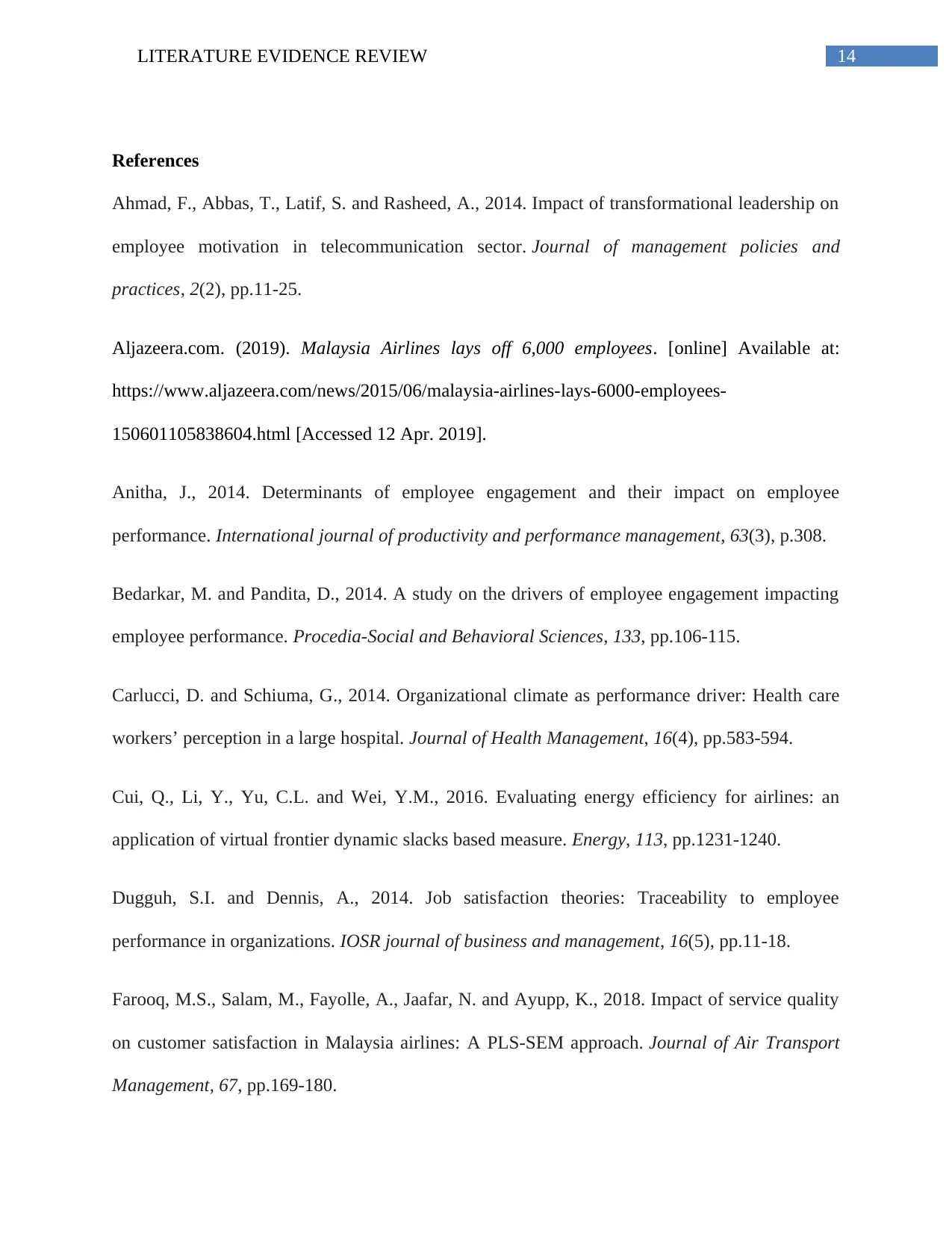
14LITERATURE EVIDENCE REVIEW
References
Ahmad, F., Abbas, T., Latif, S. and Rasheed, A., 2014. Impact of transformational leadership on
employee motivation in telecommunication sector. Journal of management policies and
practices, 2(2), pp.11-25.
Aljazeera.com. (2019). Malaysia Airlines lays off 6,000 employees. [online] Available at:
https://www.aljazeera.com/news/2015/06/malaysia-airlines-lays-6000-employees-
150601105838604.html [Accessed 12 Apr. 2019].
Anitha, J., 2014. Determinants of employee engagement and their impact on employee
performance. International journal of productivity and performance management, 63(3), p.308.
Bedarkar, M. and Pandita, D., 2014. A study on the drivers of employee engagement impacting
employee performance. Procedia-Social and Behavioral Sciences, 133, pp.106-115.
Carlucci, D. and Schiuma, G., 2014. Organizational climate as performance driver: Health care
workers’ perception in a large hospital. Journal of Health Management, 16(4), pp.583-594.
Cui, Q., Li, Y., Yu, C.L. and Wei, Y.M., 2016. Evaluating energy efficiency for airlines: an
application of virtual frontier dynamic slacks based measure. Energy, 113, pp.1231-1240.
Dugguh, S.I. and Dennis, A., 2014. Job satisfaction theories: Traceability to employee
performance in organizations. IOSR journal of business and management, 16(5), pp.11-18.
Farooq, M.S., Salam, M., Fayolle, A., Jaafar, N. and Ayupp, K., 2018. Impact of service quality
on customer satisfaction in Malaysia airlines: A PLS-SEM approach. Journal of Air Transport
Management, 67, pp.169-180.
References
Ahmad, F., Abbas, T., Latif, S. and Rasheed, A., 2014. Impact of transformational leadership on
employee motivation in telecommunication sector. Journal of management policies and
practices, 2(2), pp.11-25.
Aljazeera.com. (2019). Malaysia Airlines lays off 6,000 employees. [online] Available at:
https://www.aljazeera.com/news/2015/06/malaysia-airlines-lays-6000-employees-
150601105838604.html [Accessed 12 Apr. 2019].
Anitha, J., 2014. Determinants of employee engagement and their impact on employee
performance. International journal of productivity and performance management, 63(3), p.308.
Bedarkar, M. and Pandita, D., 2014. A study on the drivers of employee engagement impacting
employee performance. Procedia-Social and Behavioral Sciences, 133, pp.106-115.
Carlucci, D. and Schiuma, G., 2014. Organizational climate as performance driver: Health care
workers’ perception in a large hospital. Journal of Health Management, 16(4), pp.583-594.
Cui, Q., Li, Y., Yu, C.L. and Wei, Y.M., 2016. Evaluating energy efficiency for airlines: an
application of virtual frontier dynamic slacks based measure. Energy, 113, pp.1231-1240.
Dugguh, S.I. and Dennis, A., 2014. Job satisfaction theories: Traceability to employee
performance in organizations. IOSR journal of business and management, 16(5), pp.11-18.
Farooq, M.S., Salam, M., Fayolle, A., Jaafar, N. and Ayupp, K., 2018. Impact of service quality
on customer satisfaction in Malaysia airlines: A PLS-SEM approach. Journal of Air Transport
Management, 67, pp.169-180.
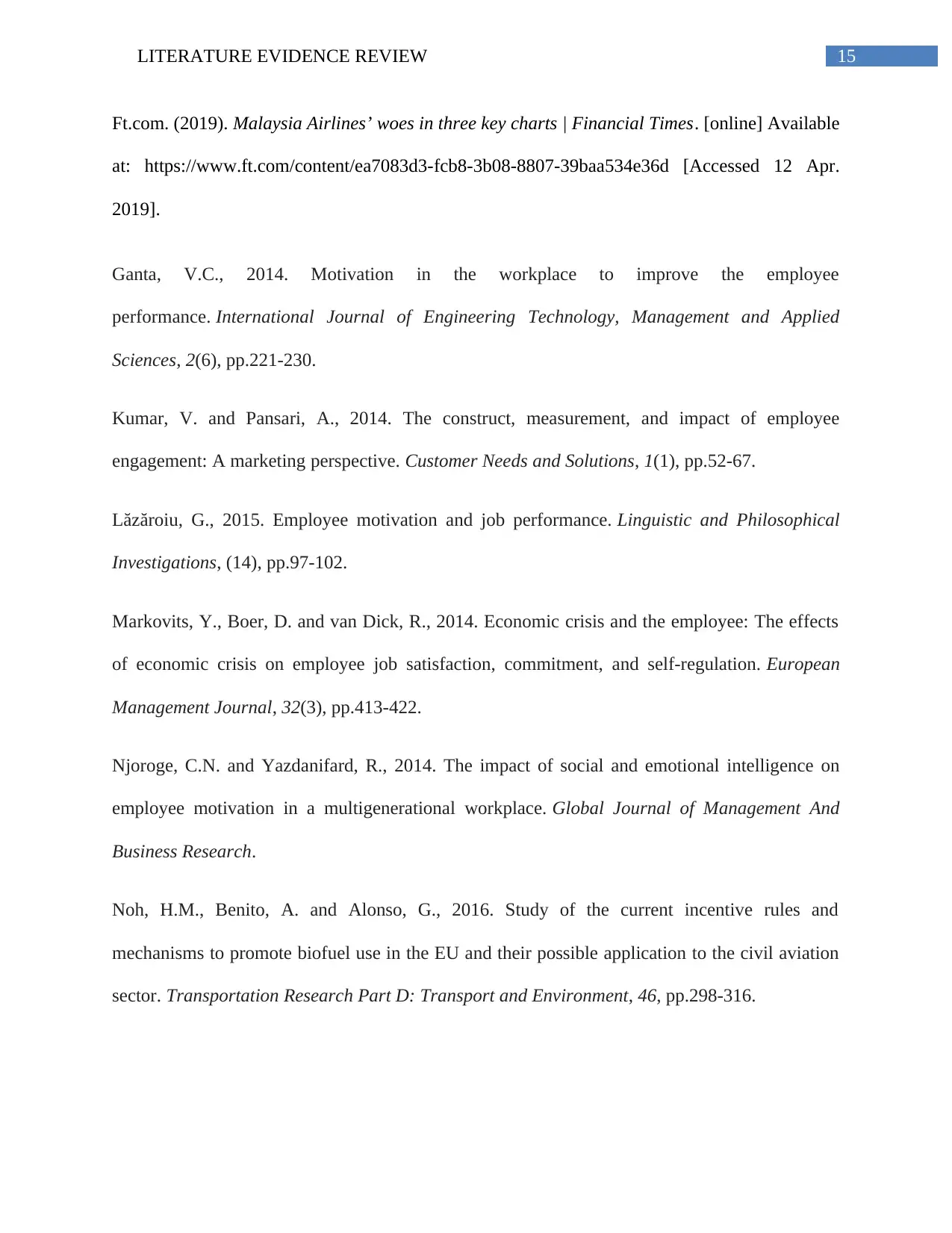
15LITERATURE EVIDENCE REVIEW
Ft.com. (2019). Malaysia Airlines’ woes in three key charts | Financial Times. [online] Available
at: https://www.ft.com/content/ea7083d3-fcb8-3b08-8807-39baa534e36d [Accessed 12 Apr.
2019].
Ganta, V.C., 2014. Motivation in the workplace to improve the employee
performance. International Journal of Engineering Technology, Management and Applied
Sciences, 2(6), pp.221-230.
Kumar, V. and Pansari, A., 2014. The construct, measurement, and impact of employee
engagement: A marketing perspective. Customer Needs and Solutions, 1(1), pp.52-67.
Lăzăroiu, G., 2015. Employee motivation and job performance. Linguistic and Philosophical
Investigations, (14), pp.97-102.
Markovits, Y., Boer, D. and van Dick, R., 2014. Economic crisis and the employee: The effects
of economic crisis on employee job satisfaction, commitment, and self-regulation. European
Management Journal, 32(3), pp.413-422.
Njoroge, C.N. and Yazdanifard, R., 2014. The impact of social and emotional intelligence on
employee motivation in a multigenerational workplace. Global Journal of Management And
Business Research.
Noh, H.M., Benito, A. and Alonso, G., 2016. Study of the current incentive rules and
mechanisms to promote biofuel use in the EU and their possible application to the civil aviation
sector. Transportation Research Part D: Transport and Environment, 46, pp.298-316.
Ft.com. (2019). Malaysia Airlines’ woes in three key charts | Financial Times. [online] Available
at: https://www.ft.com/content/ea7083d3-fcb8-3b08-8807-39baa534e36d [Accessed 12 Apr.
2019].
Ganta, V.C., 2014. Motivation in the workplace to improve the employee
performance. International Journal of Engineering Technology, Management and Applied
Sciences, 2(6), pp.221-230.
Kumar, V. and Pansari, A., 2014. The construct, measurement, and impact of employee
engagement: A marketing perspective. Customer Needs and Solutions, 1(1), pp.52-67.
Lăzăroiu, G., 2015. Employee motivation and job performance. Linguistic and Philosophical
Investigations, (14), pp.97-102.
Markovits, Y., Boer, D. and van Dick, R., 2014. Economic crisis and the employee: The effects
of economic crisis on employee job satisfaction, commitment, and self-regulation. European
Management Journal, 32(3), pp.413-422.
Njoroge, C.N. and Yazdanifard, R., 2014. The impact of social and emotional intelligence on
employee motivation in a multigenerational workplace. Global Journal of Management And
Business Research.
Noh, H.M., Benito, A. and Alonso, G., 2016. Study of the current incentive rules and
mechanisms to promote biofuel use in the EU and their possible application to the civil aviation
sector. Transportation Research Part D: Transport and Environment, 46, pp.298-316.
Secure Best Marks with AI Grader
Need help grading? Try our AI Grader for instant feedback on your assignments.
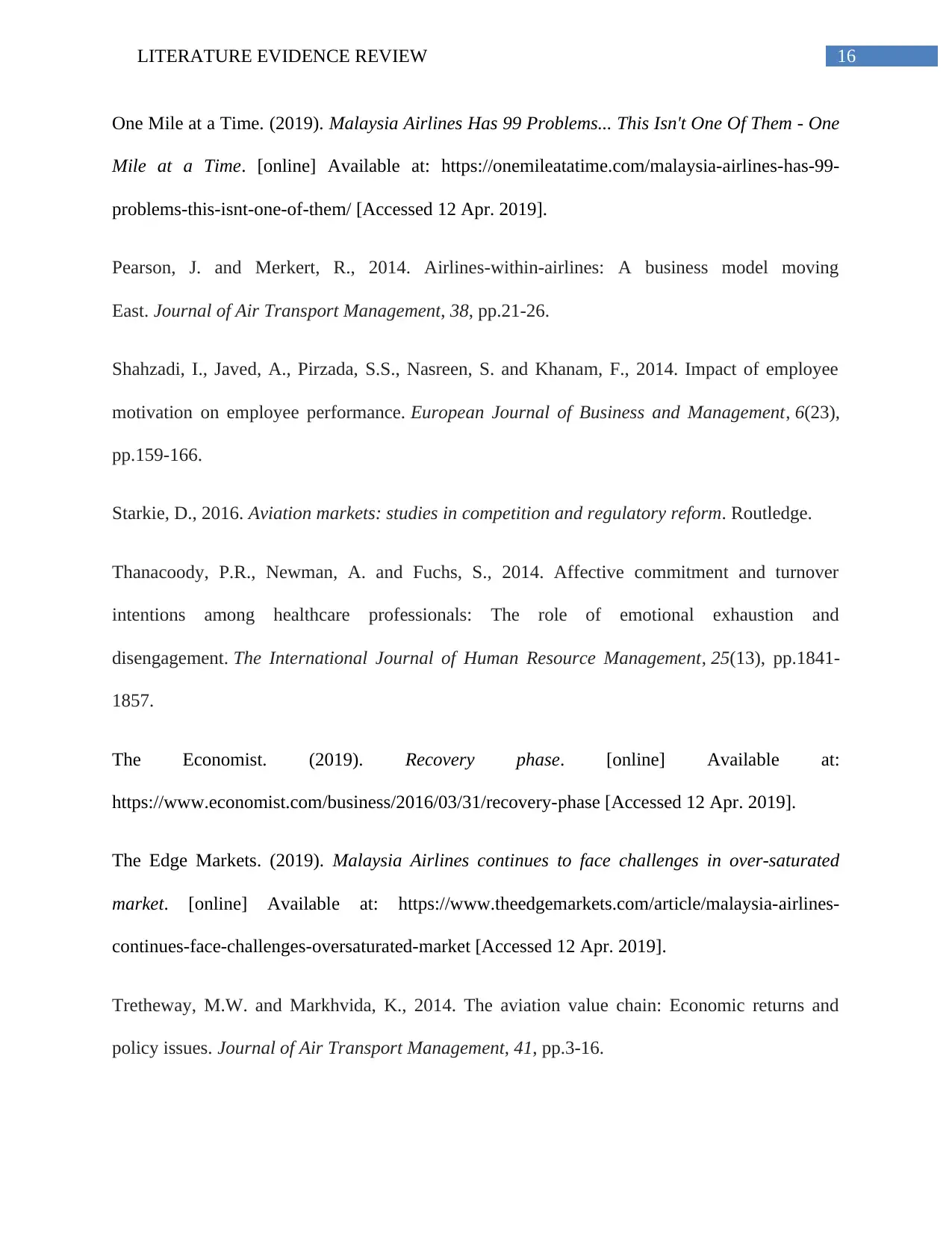
16LITERATURE EVIDENCE REVIEW
One Mile at a Time. (2019). Malaysia Airlines Has 99 Problems... This Isn't One Of Them - One
Mile at a Time. [online] Available at: https://onemileatatime.com/malaysia-airlines-has-99-
problems-this-isnt-one-of-them/ [Accessed 12 Apr. 2019].
Pearson, J. and Merkert, R., 2014. Airlines-within-airlines: A business model moving
East. Journal of Air Transport Management, 38, pp.21-26.
Shahzadi, I., Javed, A., Pirzada, S.S., Nasreen, S. and Khanam, F., 2014. Impact of employee
motivation on employee performance. European Journal of Business and Management, 6(23),
pp.159-166.
Starkie, D., 2016. Aviation markets: studies in competition and regulatory reform. Routledge.
Thanacoody, P.R., Newman, A. and Fuchs, S., 2014. Affective commitment and turnover
intentions among healthcare professionals: The role of emotional exhaustion and
disengagement. The International Journal of Human Resource Management, 25(13), pp.1841-
1857.
The Economist. (2019). Recovery phase. [online] Available at:
https://www.economist.com/business/2016/03/31/recovery-phase [Accessed 12 Apr. 2019].
The Edge Markets. (2019). Malaysia Airlines continues to face challenges in over-saturated
market. [online] Available at: https://www.theedgemarkets.com/article/malaysia-airlines-
continues-face-challenges-oversaturated-market [Accessed 12 Apr. 2019].
Tretheway, M.W. and Markhvida, K., 2014. The aviation value chain: Economic returns and
policy issues. Journal of Air Transport Management, 41, pp.3-16.
One Mile at a Time. (2019). Malaysia Airlines Has 99 Problems... This Isn't One Of Them - One
Mile at a Time. [online] Available at: https://onemileatatime.com/malaysia-airlines-has-99-
problems-this-isnt-one-of-them/ [Accessed 12 Apr. 2019].
Pearson, J. and Merkert, R., 2014. Airlines-within-airlines: A business model moving
East. Journal of Air Transport Management, 38, pp.21-26.
Shahzadi, I., Javed, A., Pirzada, S.S., Nasreen, S. and Khanam, F., 2014. Impact of employee
motivation on employee performance. European Journal of Business and Management, 6(23),
pp.159-166.
Starkie, D., 2016. Aviation markets: studies in competition and regulatory reform. Routledge.
Thanacoody, P.R., Newman, A. and Fuchs, S., 2014. Affective commitment and turnover
intentions among healthcare professionals: The role of emotional exhaustion and
disengagement. The International Journal of Human Resource Management, 25(13), pp.1841-
1857.
The Economist. (2019). Recovery phase. [online] Available at:
https://www.economist.com/business/2016/03/31/recovery-phase [Accessed 12 Apr. 2019].
The Edge Markets. (2019). Malaysia Airlines continues to face challenges in over-saturated
market. [online] Available at: https://www.theedgemarkets.com/article/malaysia-airlines-
continues-face-challenges-oversaturated-market [Accessed 12 Apr. 2019].
Tretheway, M.W. and Markhvida, K., 2014. The aviation value chain: Economic returns and
policy issues. Journal of Air Transport Management, 41, pp.3-16.
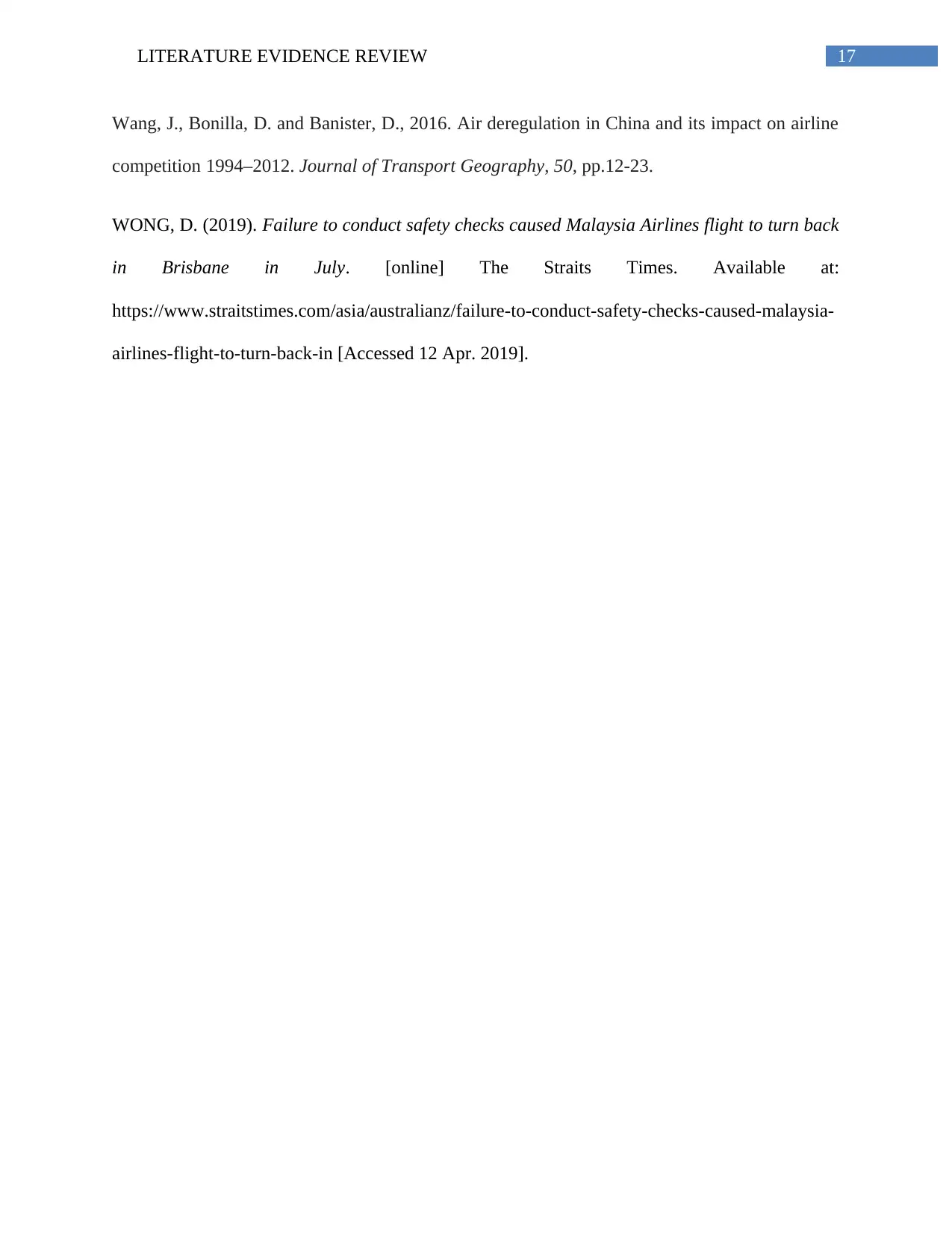
17LITERATURE EVIDENCE REVIEW
Wang, J., Bonilla, D. and Banister, D., 2016. Air deregulation in China and its impact on airline
competition 1994–2012. Journal of Transport Geography, 50, pp.12-23.
WONG, D. (2019). Failure to conduct safety checks caused Malaysia Airlines flight to turn back
in Brisbane in July. [online] The Straits Times. Available at:
https://www.straitstimes.com/asia/australianz/failure-to-conduct-safety-checks-caused-malaysia-
airlines-flight-to-turn-back-in [Accessed 12 Apr. 2019].
Wang, J., Bonilla, D. and Banister, D., 2016. Air deregulation in China and its impact on airline
competition 1994–2012. Journal of Transport Geography, 50, pp.12-23.
WONG, D. (2019). Failure to conduct safety checks caused Malaysia Airlines flight to turn back
in Brisbane in July. [online] The Straits Times. Available at:
https://www.straitstimes.com/asia/australianz/failure-to-conduct-safety-checks-caused-malaysia-
airlines-flight-to-turn-back-in [Accessed 12 Apr. 2019].
1 out of 18
Related Documents
Your All-in-One AI-Powered Toolkit for Academic Success.
+13062052269
info@desklib.com
Available 24*7 on WhatsApp / Email
![[object Object]](/_next/static/media/star-bottom.7253800d.svg)
Unlock your academic potential
© 2024 | Zucol Services PVT LTD | All rights reserved.





